

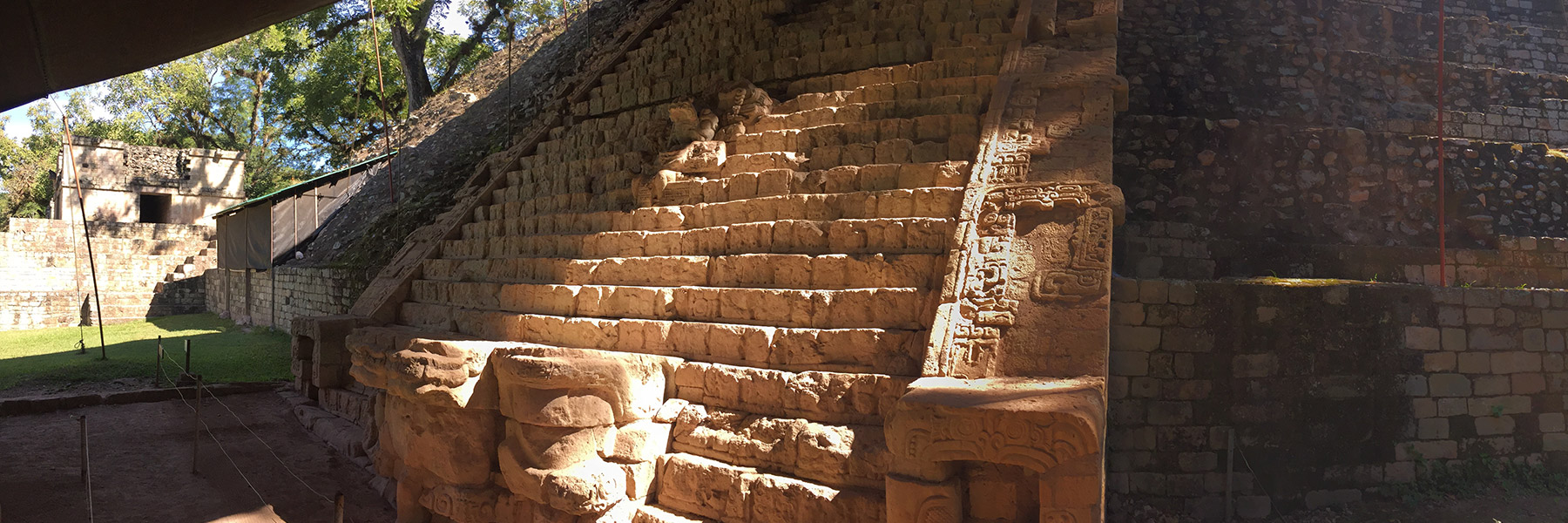
“Where are you going for your next trip, Sean?”
“Honduras.”
“H- Oh my God! Are you crazy? Do you have any idea how dangerous Honduras is?? Jeez. Well, what are you going to do there?”
“I’m going to the bottom of the ocean in a homemade submarine.”
“. . .”
I stood on the dock and looked at Idabel, the tiny sub that was going to take us to the bottom of the ocean. She was really, really small.
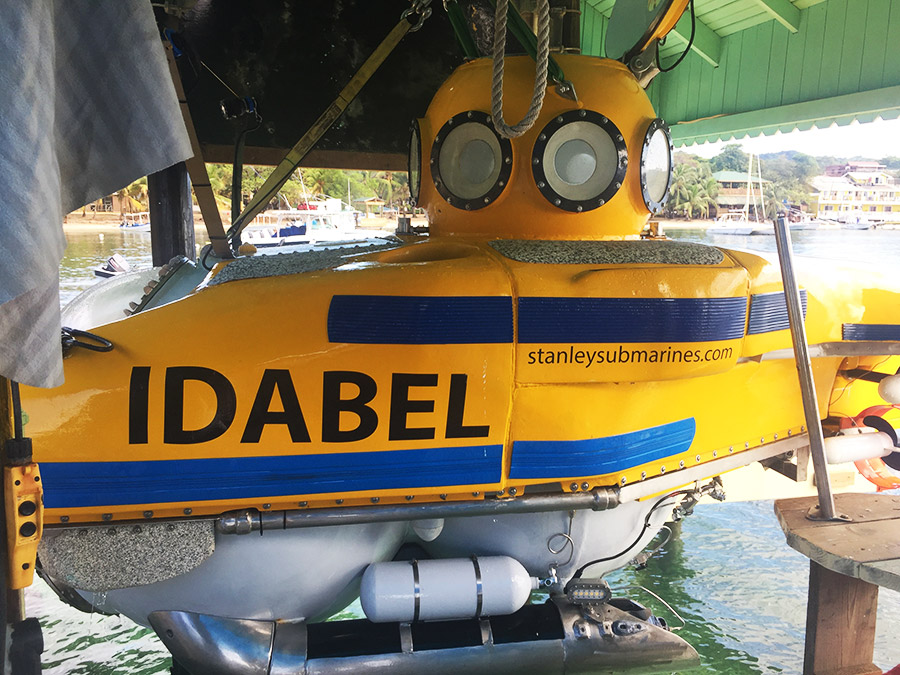
Jean from Quebec and I stared at the sub and tried to imagine how we’d fit inside. Jean’s girlfriend basked in her decision to not go anywhere near that thing.
I’d been trying to get on this submarine for a full year.
I’ve long been fascinated by the deep sea and the strange creatures that live down in the inky depths. The glowing, pulsating, alien jellyfish. The horrifically ugly and fascinating angler fish. The surreal scabbardfish that point straight up, like reality has been turned on its side. Every time I’d finish re-watching one of the BBC’s nature documentaries about the deep ocean, I’d wonder how I was ever going to get down there to see it all for myself.
It seemed impossible. Unless you’re a well-connected ocean researcher or an eccentric billionaire who obnoxiously owns his own sub, nobody’s going to take you that deep. Very few people have ever been down there.
After watching the deep sea episode of Blue Planet II in 2017, I started Googling around on the subject once again. And lo and behold, now there was a way. There was some dude in Honduras who had built his own submarine, and in it he would take you 2,000 feet down to see the bioluminescent fish and dumbo octopi. Holy shit.
The problem was, you either had to book for two people or pay for both of the sub’s seats yourself. Even paying for one seat was going to be a once-in-a-lifetime splurge for me. Damn.
I asked the sub’s builder and captain, Karl, to write my name down and pair me with the next solo rider who came along. Whenever the opportunity comes up, I’ll fly down to Honduras, just tell me the date. We had one candidate for a while, but he fell through. Months went by.
I told my brother about the sub and out of nowhere, he was keen to join me on this adventure. Sweet! I told Karl we had a duo. While visiting England last summer, I was having lunch with my brother and his wife when she asked me about the submarine trip.
“Isn’t that really dangerous?”
“Well, the way I look at it is, you have to die of something. I don’t want to die on my commute to work, that would be really depressing. If I die on a submarine at the bottom of the ocean in Honduras, I think in the big picture I’d be cool with that.”
The next day my brother contacted me to let me know he couldn’t go on the submarine with me. I really need to work on my sales pitch.
A few months later, Karl contacted me out of the blue. He had a couple signed up to take the submarine down on Thanksgiving day, but the girlfriend had just come to her senses and bailed out. There was a seat for me if I wanted it.
I booked a flight to Honduras that night.
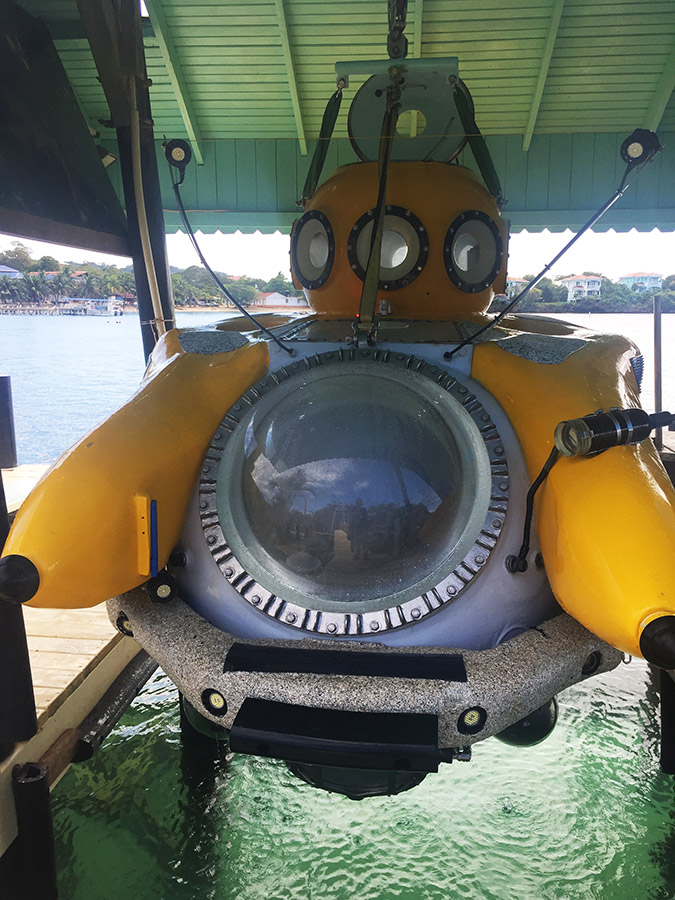
We stood on the dock in front of the sub and Karl gestured for us to climb in. This was a bit like trying to climb into a car that had been overturned by rioters. And then stuffing yourself into the trunk. I climbed up top and dangled my legs into the sub, attempting to not step on any expensive equipment. I dropped in and promptly hit my face on something metal.
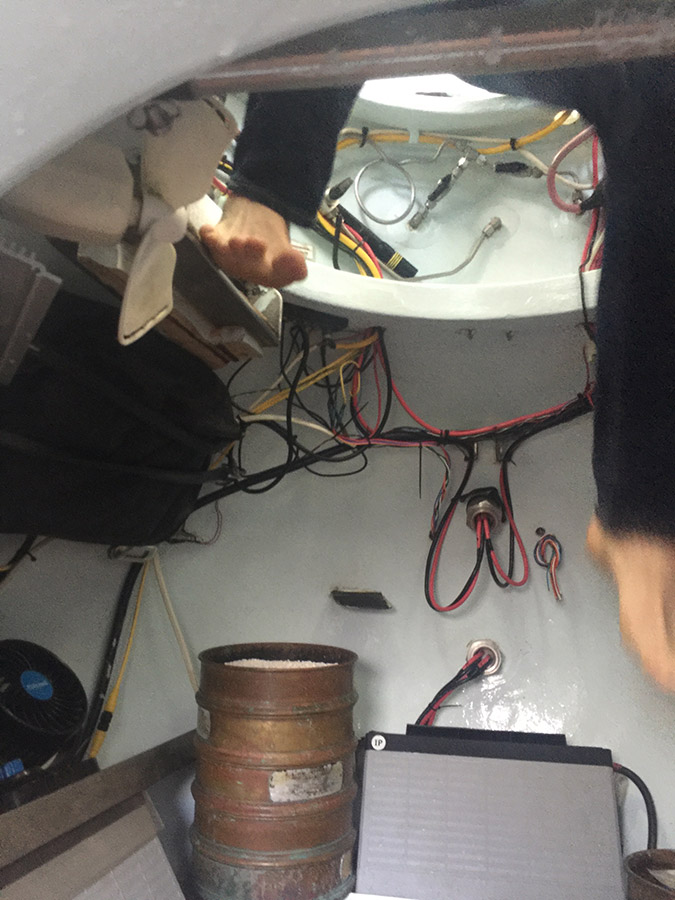
From there I crawled into the forward viewing coffin. The alarmingly small space was fronted by a curved glass dome. Jean climbed down and wedged himself in next to me. We looked at each other. I began to sweat and clicked on the tiny fan next to me, which moved as much air as a baby whistling.
This was, like most of the time I spend traveling, a terrible time to be 6’ 3”. I couldn’t quite sit up inside the viewing hutch. That’s okay, I’m only going to be mashed in here like tobacco in a pipe for the next four hours, under 70 tons of water. Karl climbed in and sealed the hatch above us.
I entertained myself by imagining a claustrophobic person in this situation. I imagined them being squeegeed off all the inside surfaces of the sub one second after the hatch was closed.
The sub was lowered down into the drink and we motored away from the dock. Our viewing port hovered half above and half below the water as we puttered along.
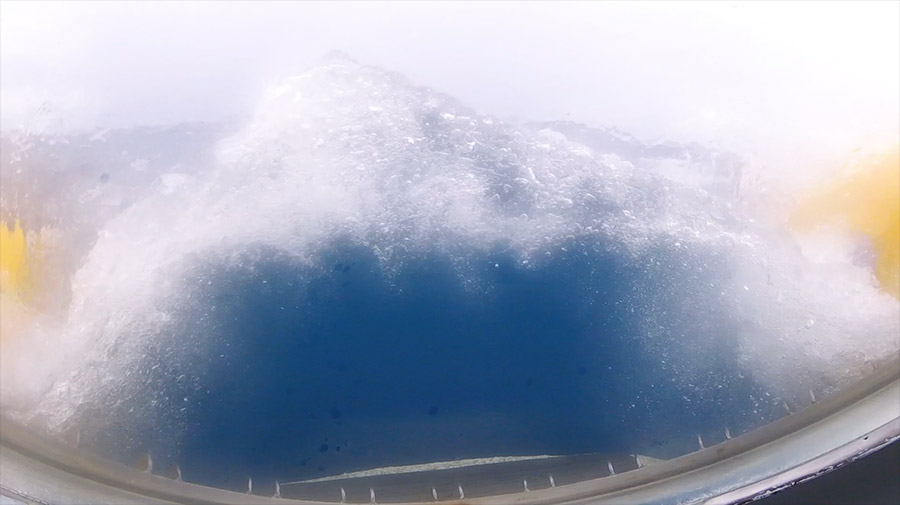
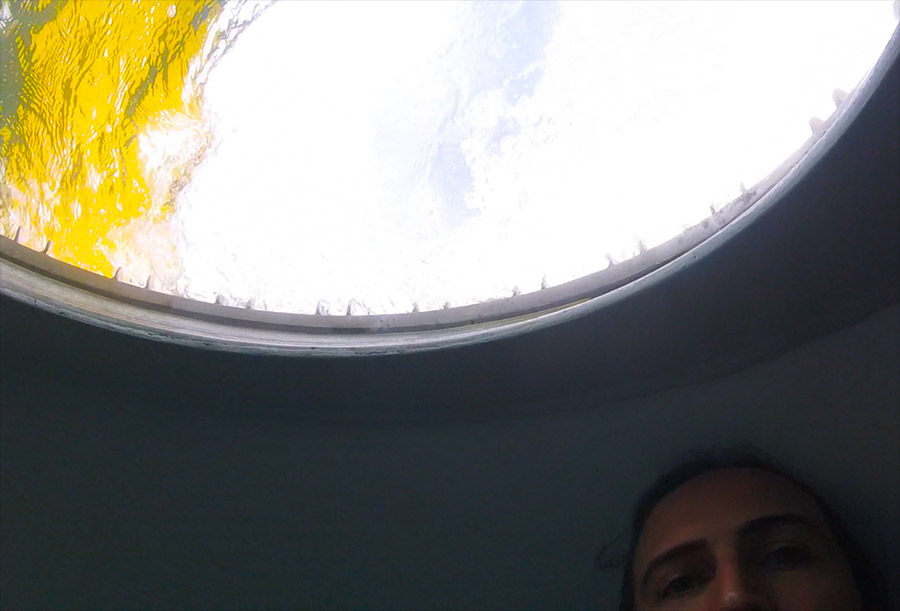
Through another pane of inches-thick glass in the floor, I watched cans and other assorted trash give way to the sea shelf dropping away into the depths.
At one point I spied a submarine abandoned on the bottom of the ocean.
“That’s my old sub!” Karl chimed in. “I built it in my parents’ backyard. The money I made giving people rides in that one allowed me to build this one.”
“You… you sank it on purpose, right?” I asked, hopefully.
“Yep, scuttled it.”
Not sure what that means but it seems to imply there aren’t the skeletons of a family of four from Peoria inside. Which is good. If it means that.
Once we’d made our way away from the coast we began to dive. As we sank through the water, I marveled at the sheer amount of stuff I was seeing. The water was an absolute soup teeming with tiny living shits. That’s a scientific term.
The shafts of light cutting down through the water gave way to a deeper and deeper murk. The little dots of living shits gave the impression of stars streaming by. The experience began to feel indistinguishable from taking a rocket through deep space. As the sea darkened around us I felt more and more cut off from everything that existed, seemingly theoretically, above us. We were in another world now.
What tiny amount of light remained, which our eyes had thirstily adapted to, drained away as we dropped into the black. For forty-five minutes we sank deeper and deeper, until the continued dropping itself could only be assumed, because there was no point of reference in the all-encompassing pitch-ass black.
Suddenly, Karl flashed some kind of strobe lights on the front of the sub. There was a brief, blinding flash of white, and then in the field of darkness in front of us thousands of squid, or honestly who knows what the fuck they were, lit up in response, answering our strobe with a pulse of their own bioluminescence. The field of white lights sprawling out at varying depths and distances from our sub was absolutely magical and didn’t show up on my camera at all.
Everything quietly faded to perfect blackness and then Karl flashed the strobes again. Again, the countless ghostly visages flared up all around us, like we were looking out into the galaxy, or had crossed over into some magical briny afterlife.
And then we dropped some more. When we finally bottomed out, I flicked on the light on our depth gauge. 2,100 feet. Wow.
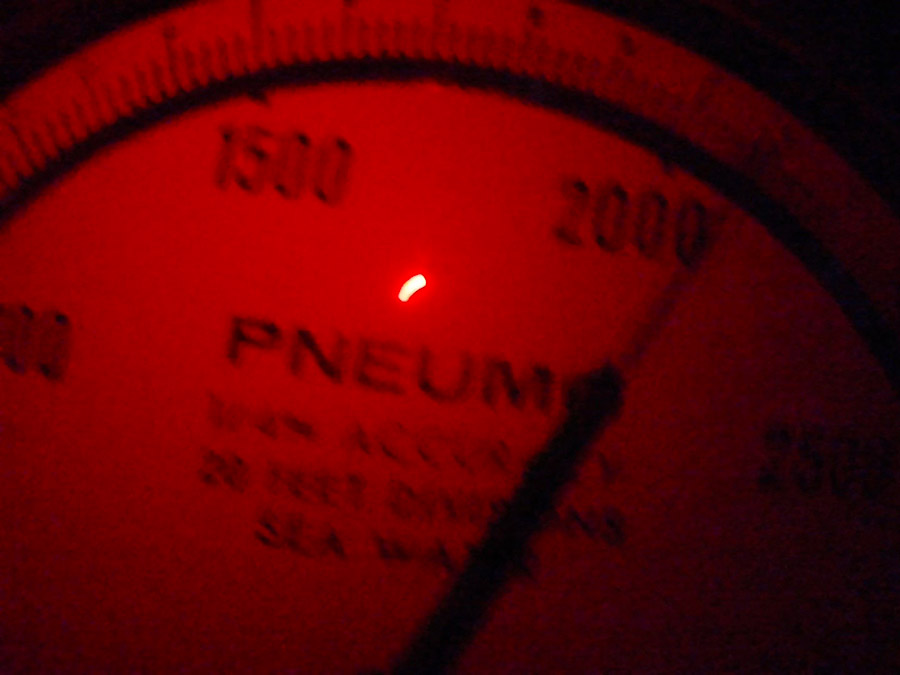
At this depth there’s some insane number of 747s worth of water weight piled up on top of you, I don’t remember what Karl said, but pick the number of big-ass planes stacked up like Yertle the Turtle that would impress or frighten you and that’s the number it was.
Karl toggled on the headlights and the ocean floor sprang to life beneath us. After some motoring around in the utter silence he spotted something peach and annoyed-looking and brought us up close to it.
Oh no way! It’s an anglerfish. This same guy was featured on Blue Planet, as his fins had evolved into feet and he uses them to walk around on the ocean floor as if that’s a thing fish just do.
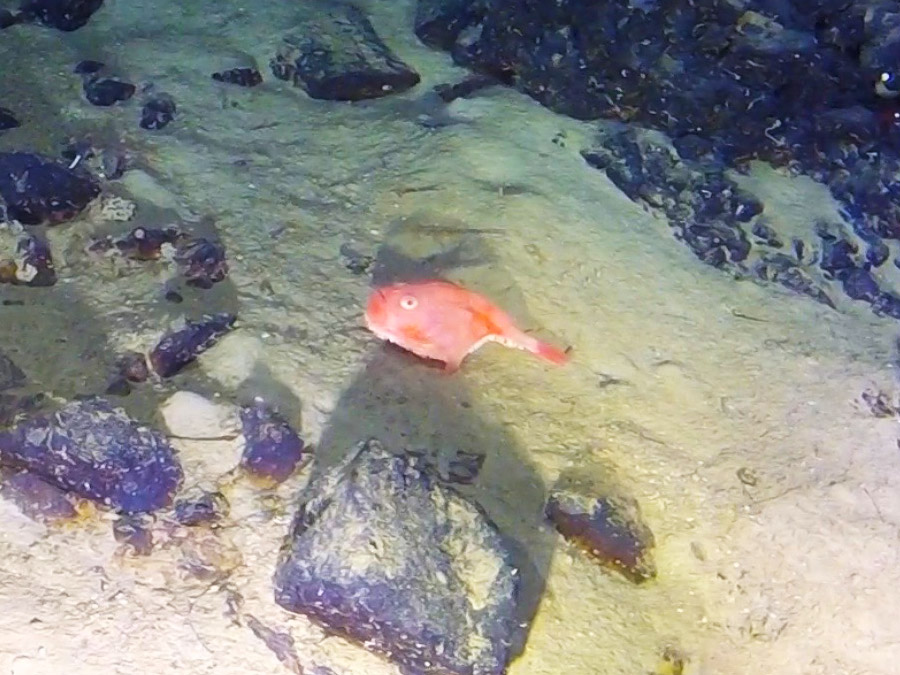
The anglerfish looked up at us like “Hmmm. No sir, I don’t like it” as we maneuvered closer and closer. Finally when we were right up next to him, he looked through the window of the sub with a face that said “Oh, you guys are- you’re gonna hang out here? I was hanging out here, I thought- Most people know this is my spot- Uhm- Look, whatever. Peace out big weird lemon!” and he waddled off in the most adorable way fishily possible.
Trip to Honduras: worth it.
From there, we wandered around the depths, hovering inches from huge rocks covered in squat lobsters, eerie white crabs, anemones and beautifully vibrant starfish.
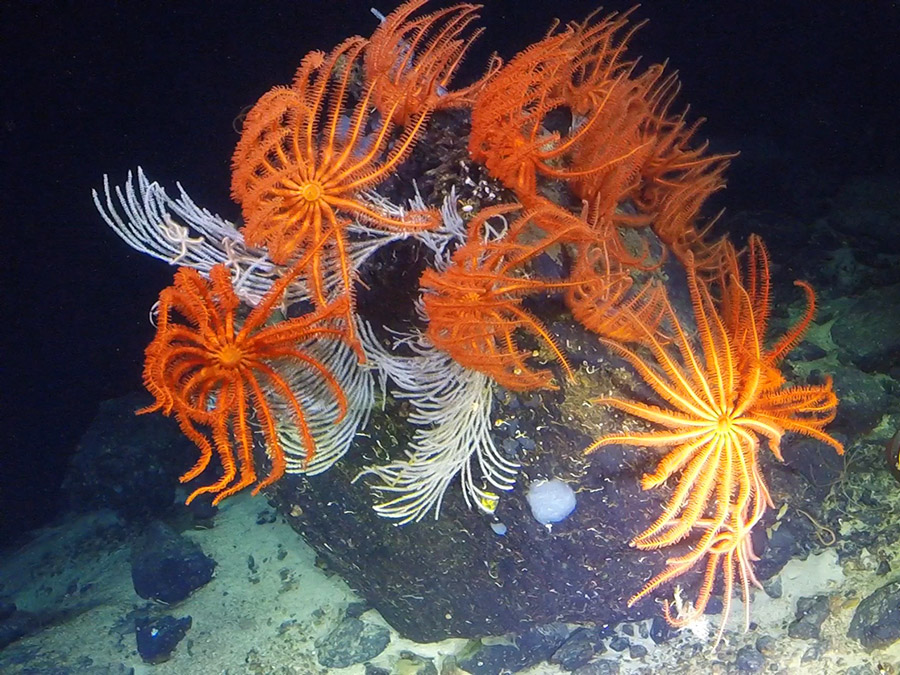
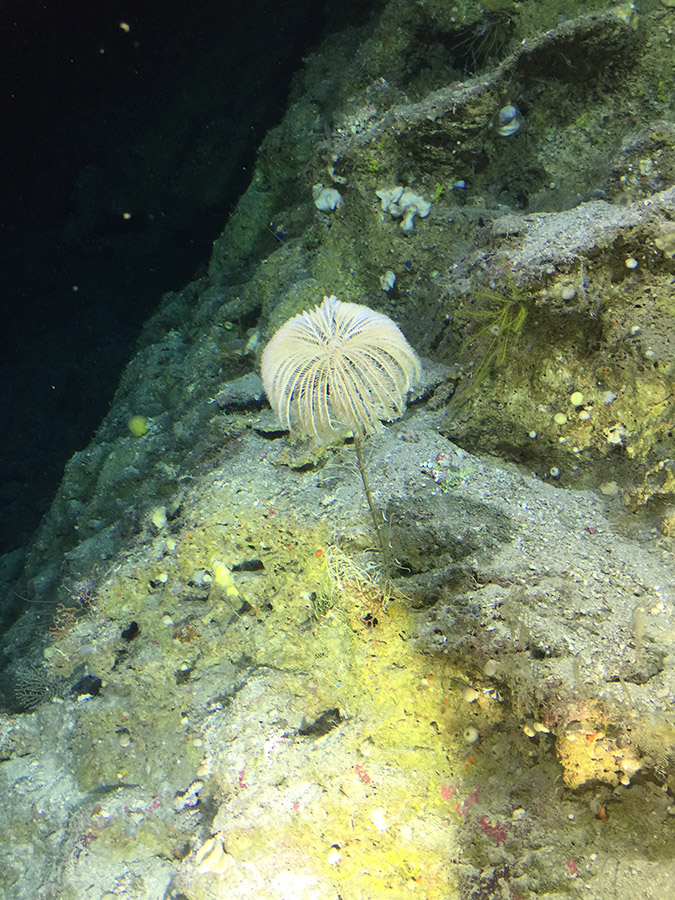
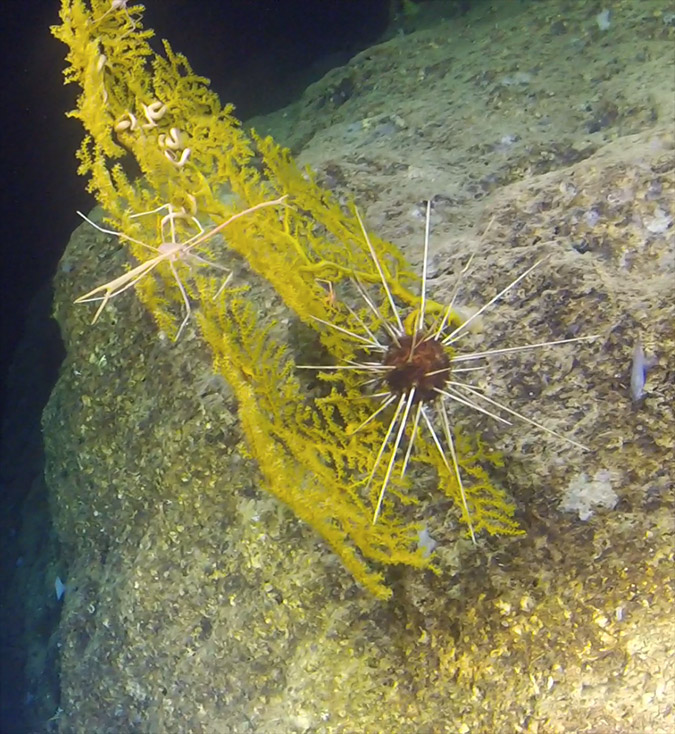
Countless unexplainably bizarre things drifted by us in the crushing depths.
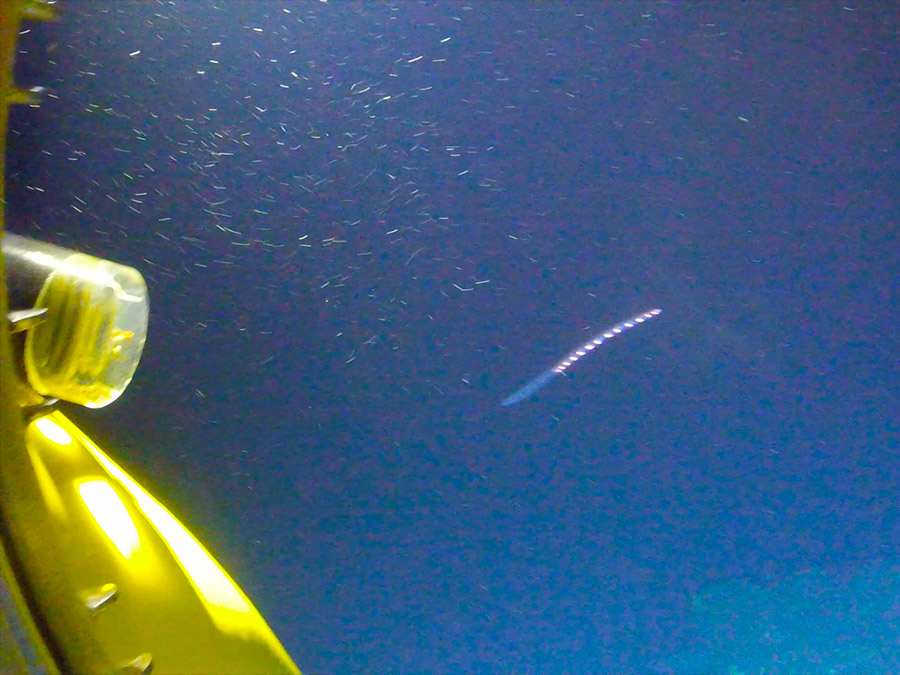
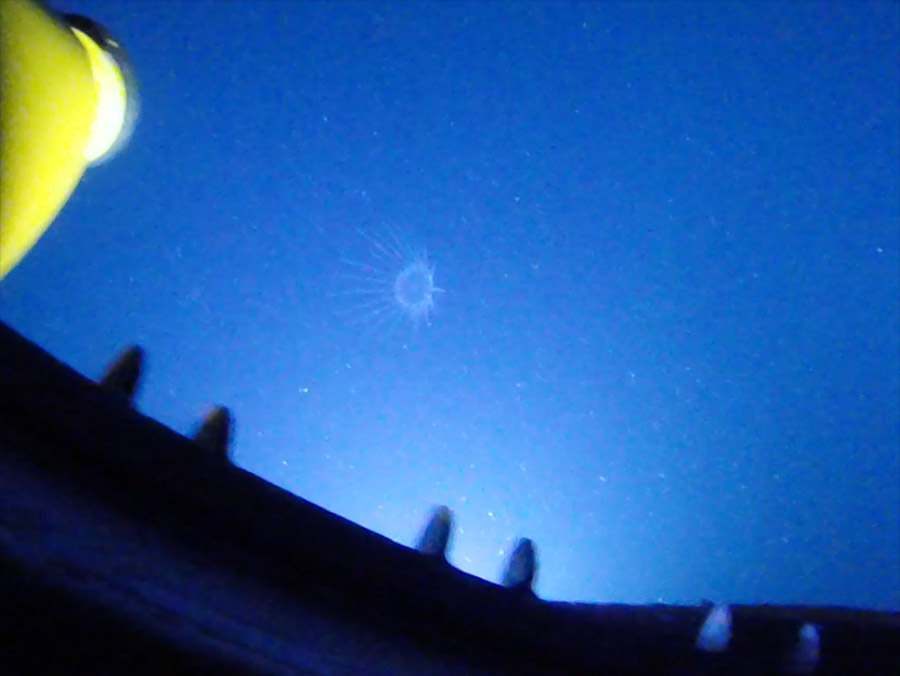
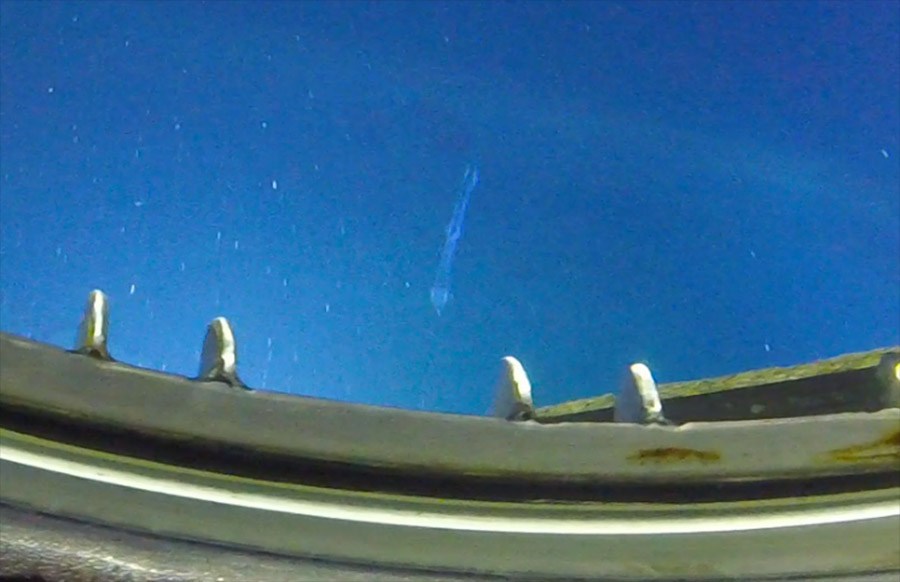
Part of the magic and weirdness of the experience was that the thick dome of curved glass we were peering through wildly distorted your sense of distance and perspective, with objects seeming to be a certain size and distance away when looking at them through the dome, then turning out to be alarmingly different on both fronts when we passed overhead and you could see them through the flat plate of glass by our feet on the bottom of the sub.
We passed a scabbardfish, which glowed brightly in the dark water and pointed straight up toward the surface, as if it was existing on a completely different plane of which direction was which, and to him we were the weirdos boogying around sideways.
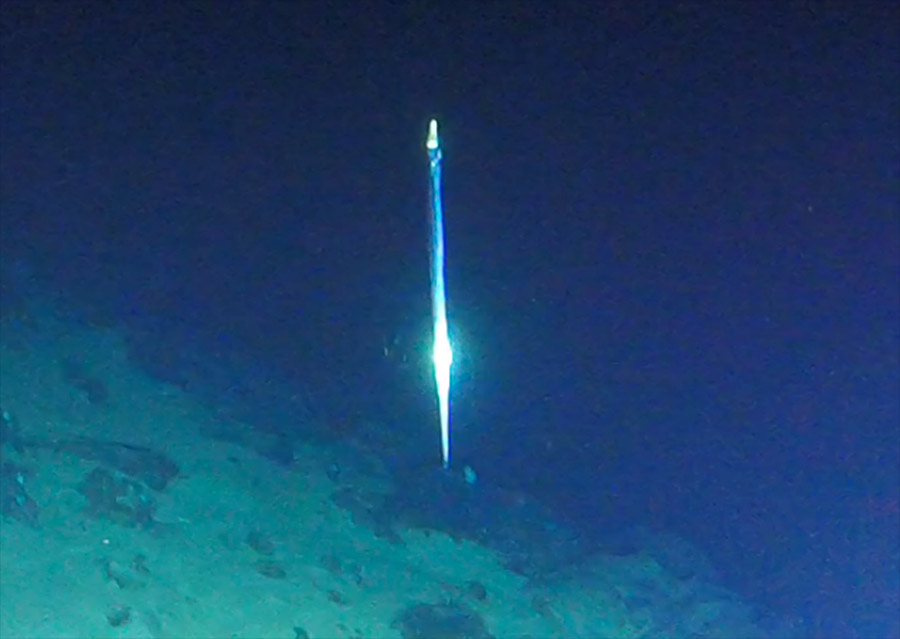
Looking at the fish through the dome, it seemed to be about six inches long. Cool. But as we glided through the water over it, I looked down and gasped as I realized the scabbardfish was about four FEET long, looking up at us with its huge eyes and needle teeth like a monster from a Tim Burton movie. Gah!
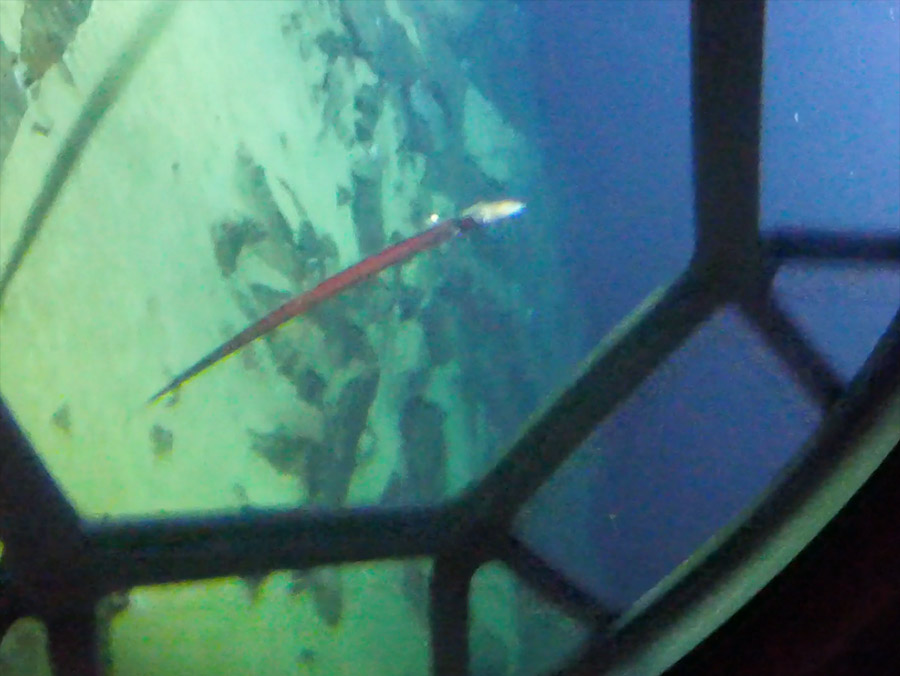
By this point, Karl had overheard me explaining to Jean the various things we were seeing, and telling him which BBC nature documentary each one was in. Karl seemed thrilled to have someone else in the sub who was fascinated by this same weird shit. He told a story about how in order to film the scabbardfish, the BBC had actually trawled and caught them, plunked the fish into an aquarium, and filmed them there. Which certainly seems like cheating, but we’re also in such a crazy environment that your chances of capturing good footage of anything are pretty absurd, as evidenced by my own photos.
One of the last things we saw was the most magical, as Karl motored us up extremely close to a Venus’ flower basket sponge, the same kind of sponge that is featured prominently in Blue Planet II. This beautiful cylindrical white sponge is hollow in the middle and made up of a crystalline lattice perforated by tiny holes. When shrimp are minuscule larvae, they’re swept into the sponge through the holes, then they grow up living inside of it. It’s a strange bargain as they’re protected from predators inside the sponge and can feed off the organisms attracted to the sponge’s bioluminescent bacteria, but they quickly grow too large to ever leave it. When the shrimp breed, their tiny young escape out the holes, leaving mom and dad to putter around their jail sponge and complain that there’s nothing good on Netflix. Forever.

These sponges are given as wedding gifts in Japan, which is, depending on your perspective, either a charming symbolic honoring of an eternal bond or a hilarious way to remind your friends that they’re utterly trapped now.
After leaving the shrimp to their fate, we gradually made our way up toward the surface, gently rising along an undersea cliff face as the water began to lighten by almost imperceptible degrees. Eventually we could see the glow of light above us, and the silhouettes of vast shoals of fish between us and the surface. As we rose closer and closer to the light, barracuda swirled gracefully above, welcoming us back to the known world.
I had been subbin’ it from Roatan, an island off the north coast of Honduras. I’m pretty sure at least 90% of the people who have ever visited Honduras have only been to Roatan, and not the mainland. Which makes sense, since Roatan is full of beautiful beaches and diving and nobody macheteing anybody in the street. I have the same strategy in mind for visiting Yemen one day via their much less insane island of Socotra off the coast.
An attendant who may or may not have actually worked for the rental car company showed me around the car as the rain began to pour down on us, obliterating the carbon paper documents I was attempting to sign. The ink bled and ran frantically in the pummeling rain like a cartoon octopus expressing its displeasure. I yelled something incoherent at the attendant and ducked into the car.
The rental car was my favorite kind, small and shitty. It quickly asserted its unique personality by wheezing like Darth Vader through the dashboard, something it did continually the entire time I was on the island. Where the hell is my AirBNB? “Huuuuul. Puuuuh.” Oh, you’re altering the rental agreement, are you car? I’ll go ahead and pray you don’t alter it any further.
I motored past a little shack that I think was there to make sure I wasn’t stealing one of the rental cars, but this wasn’t the kind of thing that rose to the level of “getting wet in the rain” importance for whoever was inside and so I puttered right out onto the road unmolested.
Accelerating along Roatan’s curvy, dipping and diving roads in the torrential rain, I attempted to work the windshield wipers while the entire car fogged up like a nervous man’s glasses. The roads had no sidewalks or shoulders at all, and so they were full of people just walking in the middle of the street, confident in their completely mistaken assumption that I could see them at all.
As I wove through the people outside the car and the fog inside it, scooters wove between me and the rest of all of this, swerving around mudslides cascading down the hillsides across the road and temporary lakes that were forming on the roadway. In the midst of all of this, I suddenly realized that the high, angry whine I was hearing was the engine revving at 5000 RPM. Oh shit, this is a manual transmission car. But there was no stickshift. I grabbed the big shifter handle, which only went forward and backwards, and attempted to move it. Nope, nothing. HRRRRRRRRRRRRN.
A dog in the street gave me an approving look as I whizzed by.
After several minutes of punching the shifter, and the car making a sound like a gigantic blender, suddenly the car shifted into a higher gear. Woohoo! How in the hell did I do that?
Several repetitions of this later, I figured out that the gear shifter had to be jostled subtly to the side, like you were trying to coax a malfunctioning television to behave. A jostle to the left moved you up a gear, a nudge right bumped you down. Even after I’d mastered it, this did not seem even remotely like the way any real car should operate. Okay Honduras. So I’m driving The Fonz’s jukebox.
I ran over something in the street. What the fuck was that?
I looked out the back window but in the rain it was impossible to see clearly what it was. It looked like a giant snake.
A few miles later, I hit another one, and realized it was a big, thick rope laid across the road. Like the kind of rope you’d use to tie up the Queen Mary. I surmised it must be some kind of low-budget speed bump. This was completely ineffective against cars, but I gradually realized it was meant more to slow down scooters, which have a lower tolerance for running over big weird things that might be snakes at full speed.
Finding the AirBNB proved to be a challenge since there are no addresses on Roatan. There are streets, but once you’re on the right street you’re on your own. When I was coming through immigration after landing on the island I’d been a little worried that all I could find was the street name of where I was staying, but the girl didn’t seem to think this was strange at all.
I drove around in the rain until I saw something that looked like the photo I’d seen on AirBNB when I’d booked the place. After wandering around and talking to a maid, I eventually found a dude who explained that I was at the wrong place, there was another place that looked exactly like this back in the town I’d just driven through. Eventually I found it, driving up a preposterously steep ramp into the mud-wrestling pit out back that doubled as a parking lot. The ramp was kind of hilarious because the only way to make it to the top was to hit it going fast enough that you’d KACHUNK the front of your car on the slope on your way up. This was mostly hilarious because it wasn’t my car.
I checked into my room and immediately locked the safe combination inside the safe. Whoop- Okay valuables, you’re going under the bed. No one ever thinks to check there, unless you’re robbed by little kids. Inside the room, the humidity was 3,000%. I marveled at the little tub of radioactive blue Honduran cleaning schmutz next to the sink. Next to the stove there was a tiny box of damp matches.
Downstairs there was a bizarrely empty supermarket, where I bought a 7 cent box of hopefully dry Black Cat matches to light the stove. Something that may or may not have been a banana hid under flies in the corner of the room.
Immediately across the road from my room sat a beautiful beach, where I sat semi-beautifully and watched as the storm rolled out across the ocean. A bunch of yabbos swung from a rope attached to a boat mast and flung themselves into the sea.

That night I decided to check out the island’s one vegan restaurant on the other side of the bay, which was hilariously ill-advised. Another storm rolled in as soon as I got in the car and I spent the 40-minute drive mentally willing my little car to cling to the wet pavement as the road unpredictably leapt into the air, suddenly dropping away below the car and veering violently left and right without warning on the unlighted roads in the black, rainy night. The entire drive was an insane roller coaster, and I only hoped it didn’t have the same ending as Splash Mountain.
At one point I drove into a huge gated community on accident, I’m not sure why the guards let me in other than I must have looked too confused to possibly be a burglar. At the top of the hill I ended up on someone’s lawn and had to turn around and navigate precariously back down the wet black road that only looked about one percent different from the black sides of the road and the black sky and the sea.
The restaurant was closed because it’s Roatan and it wasn’t the right month for Roatan to have restaurants.
After my sub adventure in the morning, I drove across the island and took in the Carambola Gardens. My first choice was actually to go to a sloth refuge and hang out with sloths, but it’s surprisingly difficult to line up your schedule with a sloth’s.
At Carambola I hiked through the dense jungle and pretended I was in Predator. I ain’t got time to blee- OW, that flower is sharp!
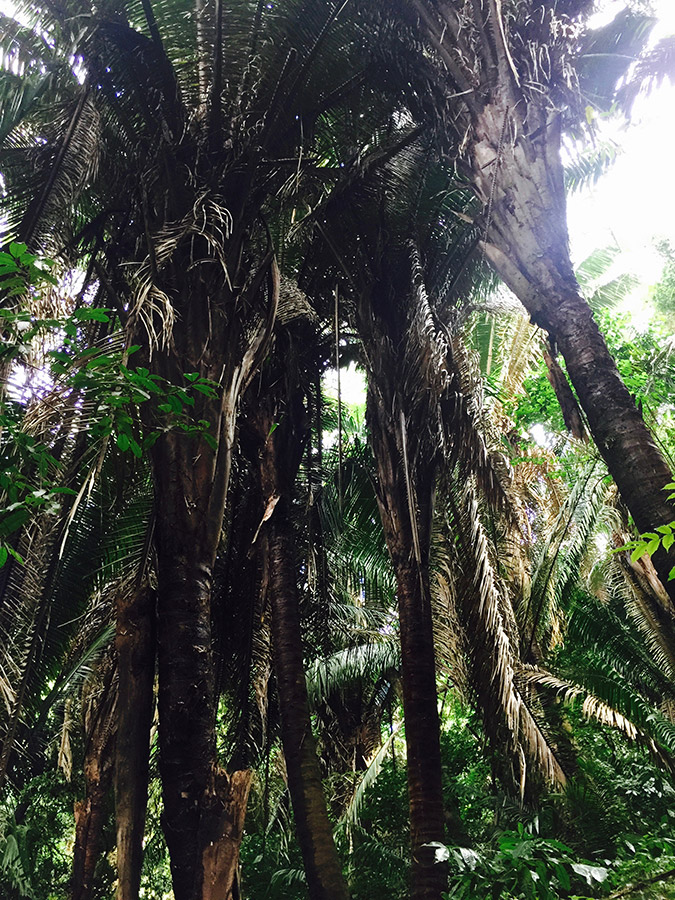
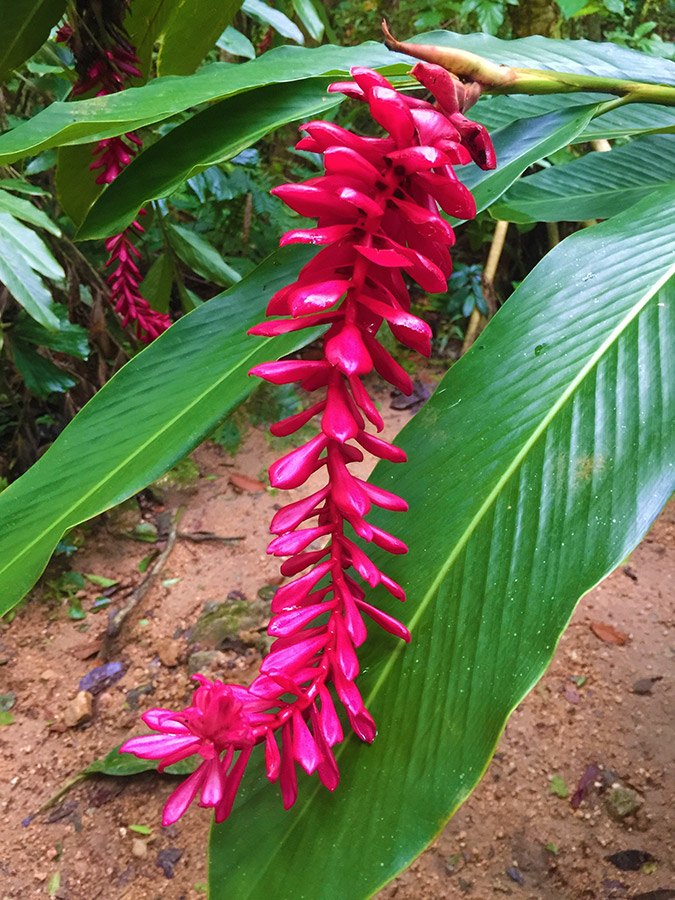
I climbed the mountain to the top and stood gingerly on a viewing platform that had mostly collapsed and been reclaimed by the jungle. Happy Thanksgiving. I’m thankful that I get to do things like this and that I remembered to pack boots. Iguanas scrambled through the brush around me clumsily, like snakes that had just been given legs as a surprise gift that morning.
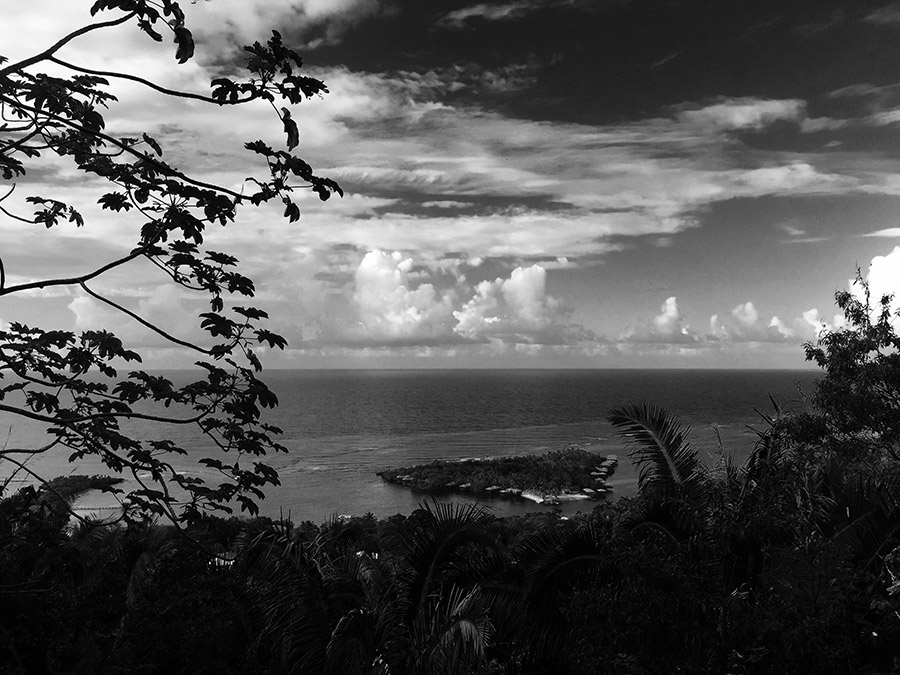
I looked down at a line of giant ants crossing the trail. Are these those crazy ants that can eat you or bite like a bullet or talk like Woody Allen? I asked the ants but got no response.
In the morning I was flying to the mainland. A week before my trip, the airline had called to say they were delaying my flight by four hours, which basically was going to set the entire rest of my trip on fire. After several circular conversations about this I ended up buying a second ticket from the island’s other airline. At the airport I looked at both tickets and tried to remember which one was actually taking off. I held onto both of them, happy in the knowledge that I could get on whatever plane happened to show up.
The tiny plane that did arrive was like riding in somebody’s car that they’d somehow rigged to be able to fly. Takeoff usually feels like a gradual process, an inevitability of speed and lift. I was sitting behind the pilot, and thus got an uncomfortably clear view of everything he did. After ambling down the runway not particularly quickly, the dude suddenly yanked back on the stick like we were hopping over a shopping cart that had drifted onto the runway and LURCH STALL BRRRRT we were flying.
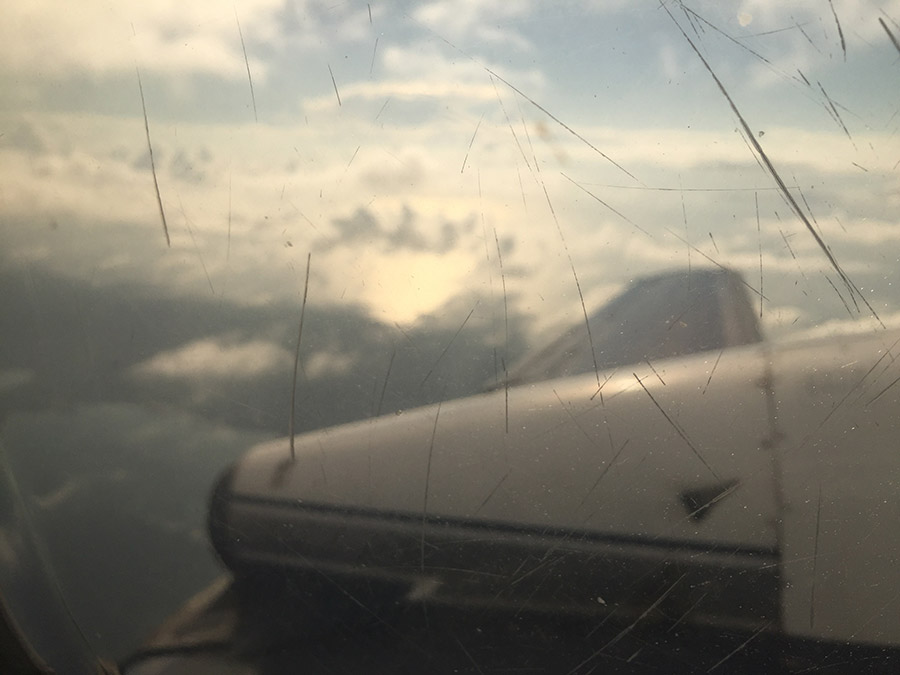
Stepping off the plane and walking into Aeropuerto Ramón Villeda Morales in San Pedro Sula, I looked around and realized I was the only gringo in the entire joint. Which is a funny experience when you’re in a country’s largest international airport. Clearly, my fellow caucasians have not been informed that you gotta die sometime. I think my sister-in-law may have called them.
I walked by the Pizza Hut and the Wendy’s. Huh. Didn’t expect to see those here. I walked by a woman playing a pan flute in the middle of the arrivals hall. I hummed along.
“No April rain… No flowers bloom…”
Oh my god. It wasn’t Uzbekistan. It’s me! This song is following ME!
After embarrassing myself with my shit Spanish at the information kiosk, a kindly Honduran woman led me down a narrow hidden hallway to the Hedman Alas counter so I could check in for my bus.
Getting across the mainland of Honduras safely had taken some figuring out. The U.S. government warns people not to go to Honduras at all, due to the prevalence of kidnappings and other high-level bummers in the country. I generally take U.S. government warnings with a grain of salt, as they’re often hysterical and politically motivated. But Human Rights Watch had also warned that “rampant crime and impunity for human rights abuses remain the norm in Honduras.” Which is concerning.
Honduras has the second-highest murder rate in the world, and the city of San Pedro Sula has a rate that’s over 10 times that of Chicago. Tourists are advised to stay out of San Pedro Sula entirely at night, and to not leave your hotel after dark if you’re already there, as tourist hotels are often staked out by thieves. I read stories online of people being robbed or kidnapped in their taxis on the way from the airport. There are also gang wars and machete fights in the street sometimes.
I think people tend to overreact to these kind of things, as while bad shit does certainly happen, the vast majority of the people who visit any country have no problems at all. And you can greatly mitigate your risk with some basic street smarts. But I still understood that this was the most dangerous country I’d ever visited, and it’s a more fun vacation if you don’t get killed. So I’d done my research before I went.
The most entertaining element I added to my travel repertoire in preparation for Honduras was the throw-down wallet. This is a second, decoy wallet that you carry on you in case you get mugged. I filled mine with about $15 in one-dollar bills and an old expired credit card and old driver’s license. I suppose if you weren’t so interested in authenticity you could probably stuff it with photos of Betty White or cat hair or whatever, but I figured it was worth $15 to not get shot in the face in the event that the mugger took a second to look inside the wallet and count his spoils as he was running away.
I don’t know if it’s called a throw-down wallet because it only comes out when you’re getting your ass kicked, or because you’re supposed to throw it on the ground like “Here, take my money!” I never got to find out because nobody tried to rob me in Honduras. Don’t look so disappointed.
But, I still needed to find a good way to get from San Pedro Sula in the east to Copan in the west of the country. Flying wasn’t an option. Also, there was some civil unrest happening in some of the areas I’d be passing through, so I probably didn’t want to be toodling through in a rental Tercel. Locals take the chicken buses, which are old American school buses that have been retired from service and end up down in Central America, repainted and used for inexpensive public transportation. The name comes from the likelihood that you’ll be sharing your seat with a chicken on one of these rides. Plenty of backpackers use them without incident, but some do get mugged on the buses and/or have their luggage stolen. I was more concerned with my inability to talk my way out of trouble with my bullshit Spanish, so I opted for one of the more secure first-class buses, which have security measures similar to an airport. So it’s basically like a nicer version of flying Spirit Airlines.
The bus from the airport was going into the city of San Pedro Sula itself, where I was ticketed to hop on another bus to Copan. The problem was that the 15-minute ride into the city took 45 minutes. The roads in Honduras are serious bullshit and the traffic is intense. Our bus crawled forward as I tried to telepathically will the driver into trying an alternate route. I imagined the bus in San Pedro Sula leaving without me, then immediately tried to visualize a happier outcome. The bus I was desperately late for was the only bus going to Copan that day, so if I missed it I’d be stuck overnight in Murder City.
I distracted myself as we crawled along in traffic by photographing the fascinating chicken buses we passed:
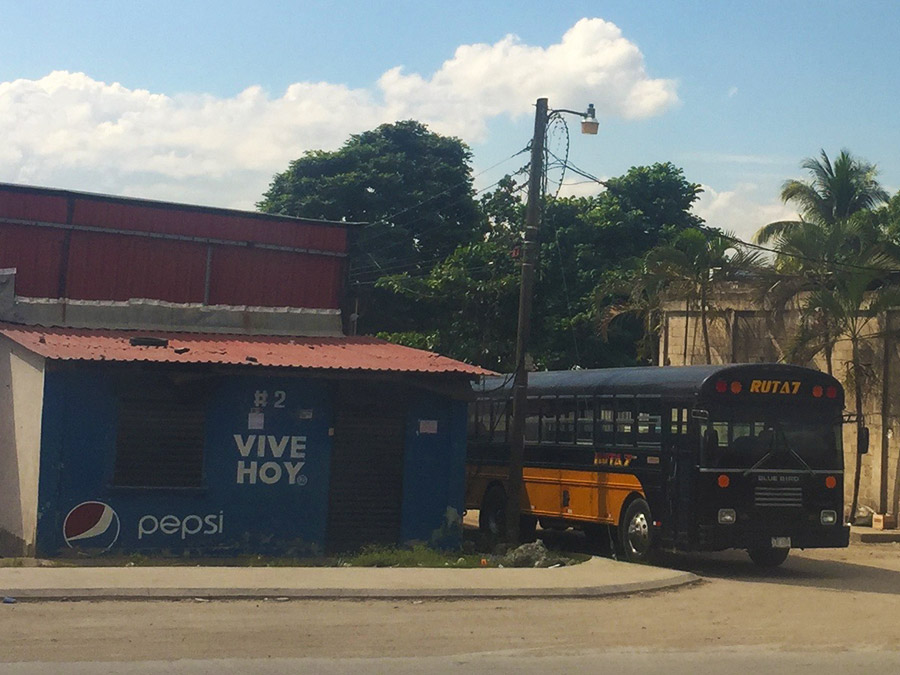
When we finally pulled into the bus station, I had zero hopes of making the Copan bus. We were that late. It had to be long, long gone. I figured I’d just hang out in the tiny bus station until I figured out a new plan or they kicked me out. I really didn’t want to spend the night in San Pedro Sula, so after sitting for a while, I joined the people lining up for whatever the next bus was. Maybe they’d let me on by accident, and wherever it was going had to be a safer place to spend the night than San Pedro Sula. To my surprise, after taking my photo for security purposes, they waved me through. I got on the bus and picked a seat. I wonder where we’re going?
I furrowed my brow and tried to de-Spanish the rapid conversations happening all around me. Copan? Holy shit, this is the bus to Copan! I laughed out loud at the thought that the absurd slowness of traffic in Honduras had been perfectly balanced out by the absurd unpunctuality of their buses.
I spent the hours of the bus ride trying to figure out what the Honduran movie was that they were playing silently on the bus TV. It featured some kind of budget knock-off of The Rock. Then suddenly Yeardley Smith showed up on the screen. What is Lisa Simpson doing in a Honduran movie? I spent the rest of the movie trying to figure out if Smith was slumming in Honduran productions now or if this was just an American movie so obscure I’d never heard of it. Once I got home after the trip I figured out it was indeed an obscure American suck-fest, The Chaperone starring budget Rock Triple H.
Entering Copan, carrying all my shit in a bag, I was greeted by a gang of drunk hobos. They were the friendly sort. We chatted for a while, to the limits of my Spanish and their inebriation, before I bid them a warm farewell and continued wandering around looking for my hotel.
Copan didn’t have any street signs that I ever saw, but there was a restaurant on my street that proudly announced their possession of TACOS, so whenever I was trying to find my way back to my hotel I just remembered that I was staying on TACOS street.
After dropping off my stuff at the hotel I ventured into the central square, which featured this great fountain...
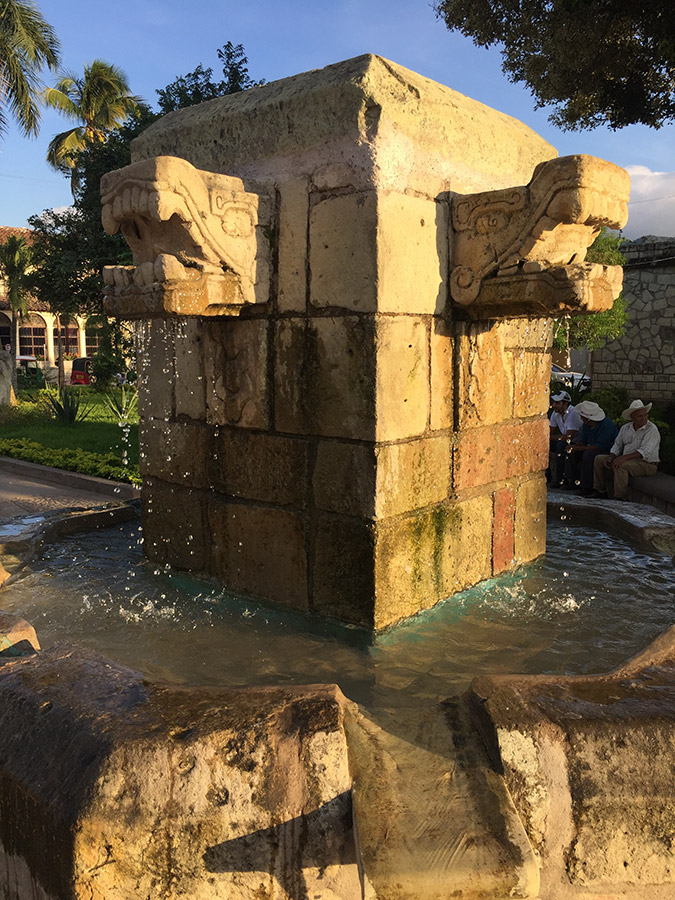
...great dudes in hats, and this statue of a god who was in God Jail for making that shitty raisin loaf nobody likes:
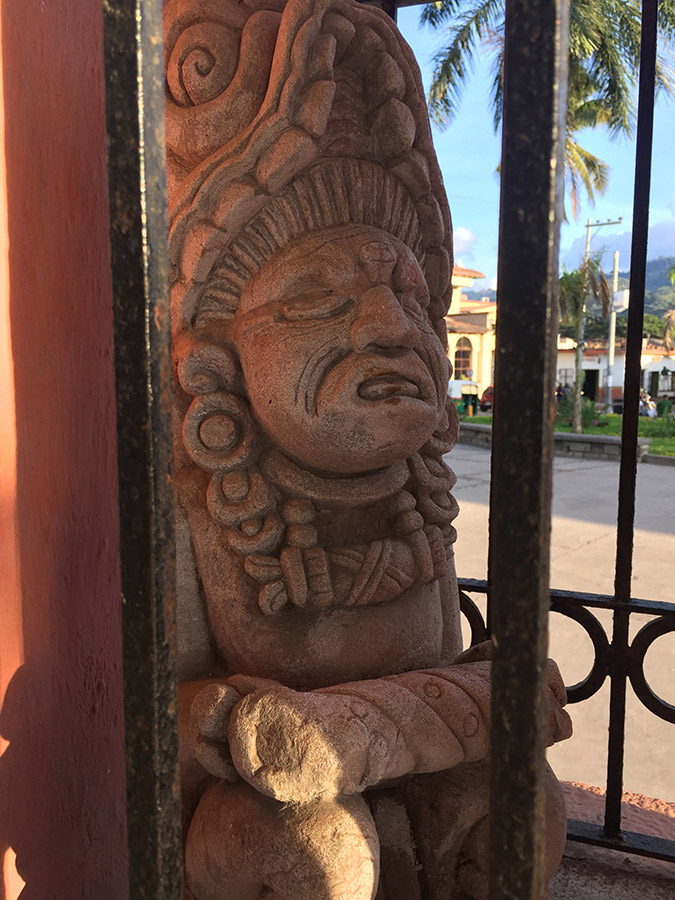
Also, the ancient Hondurans had already seen Aliens:
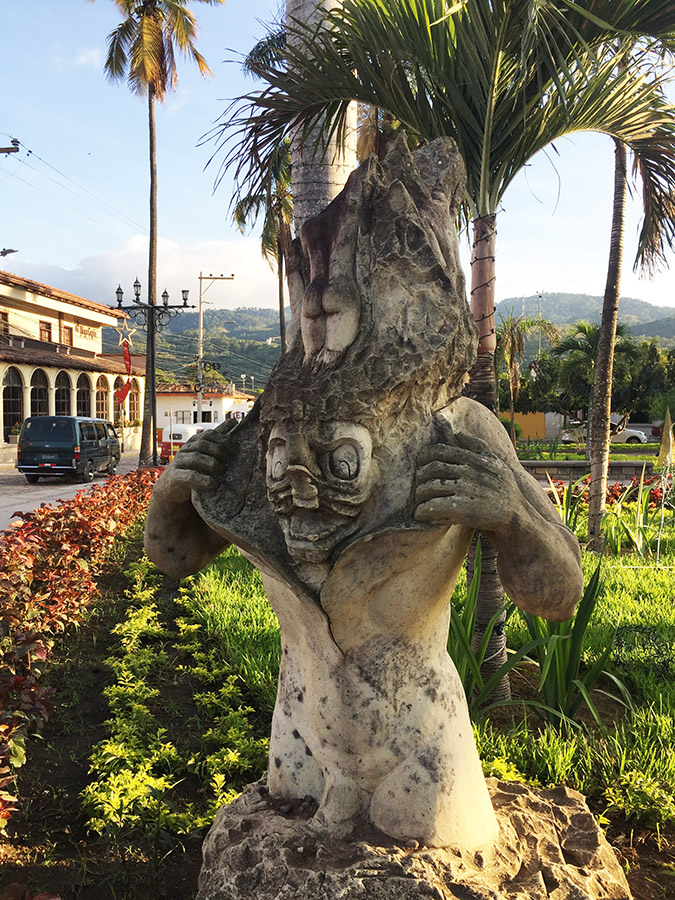
The sun was about to set, so I browsed around the town looking for the best unobstructed view of the sunset. Walking down one steep street, I had to step over several large dogs that were obliviously asleep on the sidewalk. This was both ominous and hilarious, trying to find spots big enough for my feet between the sprawled dogs, who paid this no mind at all. I turned the corner and wandered around further before deciding that the top of the hill with the dogs was in fact the best viewpoint.
Walking back up the hill, the dogs suddenly sprang to life and made it clear through fierce barking and running at me that they were going to have none of this “me walking up the hill” nonsense. This was simultaneously scary and hilarious, as I had just stepped over these same dogs two minutes ago. They clearly had very strong stereotypes about uphill-walking people, who obviously posed a much larger threat than the downhill-walking people we all know and love. Once it became clear the dogs were going to stand their ground, I walked back down the street, all the way around the block, and back to that same spot from the top of the hill. The dogs didn’t mind this one bit.
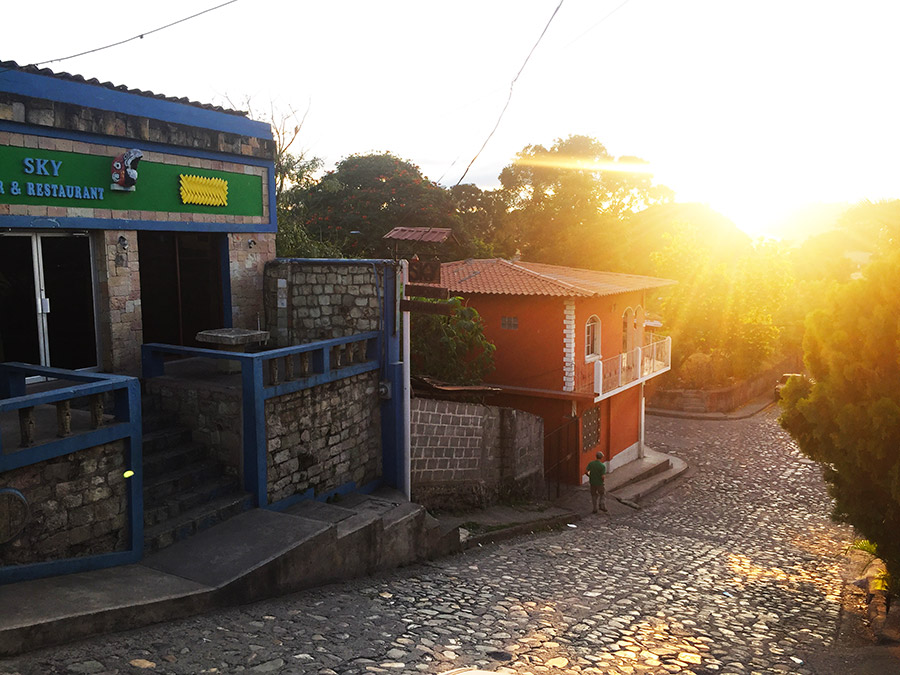
Of the three vegan-friendly restaurants in town I’d been able to find online, one was a gift shop now, and one was an address that didn’t actually exist. The third was thankfully still in the food business. I ended up eating there three times, each time impressing myself with my growing and survival-inspired ability to place complicated food orders in Spanish, in spite of the fact that people in Honduras speak a different variation of Spanish than people in Peru or Chile.
People often ask me if being vegan makes travel more difficult. Oh hell yeah it does. Duh. When I talk to people who are afraid to travel because of the language barrier, I explain that you can really get by anywhere in the world just by pointing and smiling and being patient and polite. Unless you’re vegan. Then you actually have to be able to communicate enough to ask if this has milk or eggs or huge hunks of walrus in it, and to actually understand their response, and to gauge if they actually know what they’re talking about or are just trying to get you to order something already.
As I sat in the restaurant and ate my massive baleada, I noticed my legs were itching. Huh. I must have brushed up against something when I was hiking through the jungle on Roatan.
The next day, sitting at the same table, my legs suddenly began to itch again. Hmmm. I looked around at all the paintings of dogs on the restaurant walls. So, this is a dog themed restaurant. I looked down and a stray dog wandered by my table, which was deep inside the restaurant. Huh. I looked around again. Oh.
I don’t know how to say “your restaurant has fleas” in Spanish.
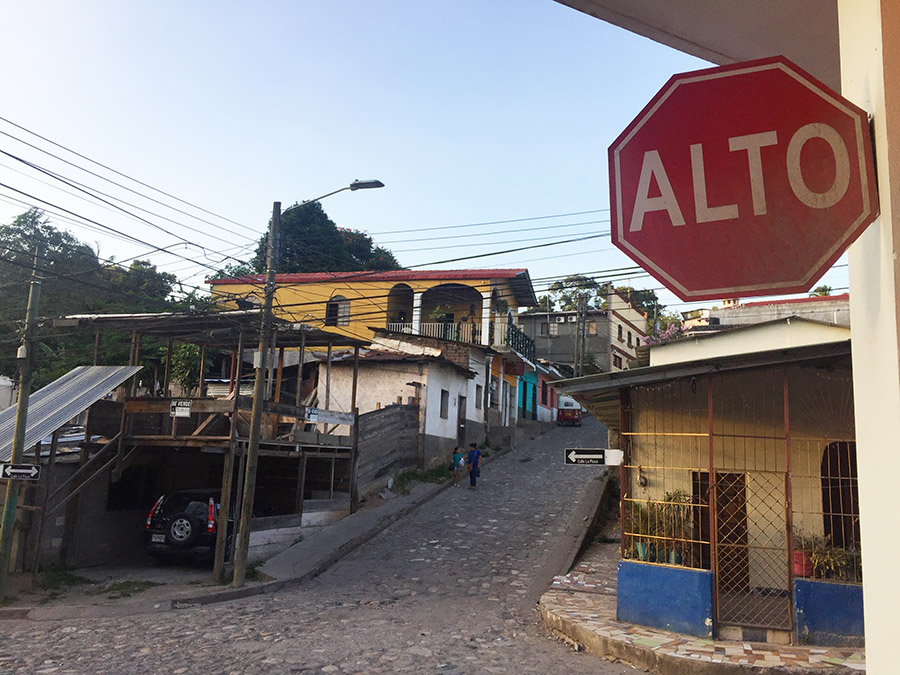
I was mostly in Copan to visit the Mayan ruins nearby, but the town itself was full of its own charms. The town’s museum was small but full of fun weird things.
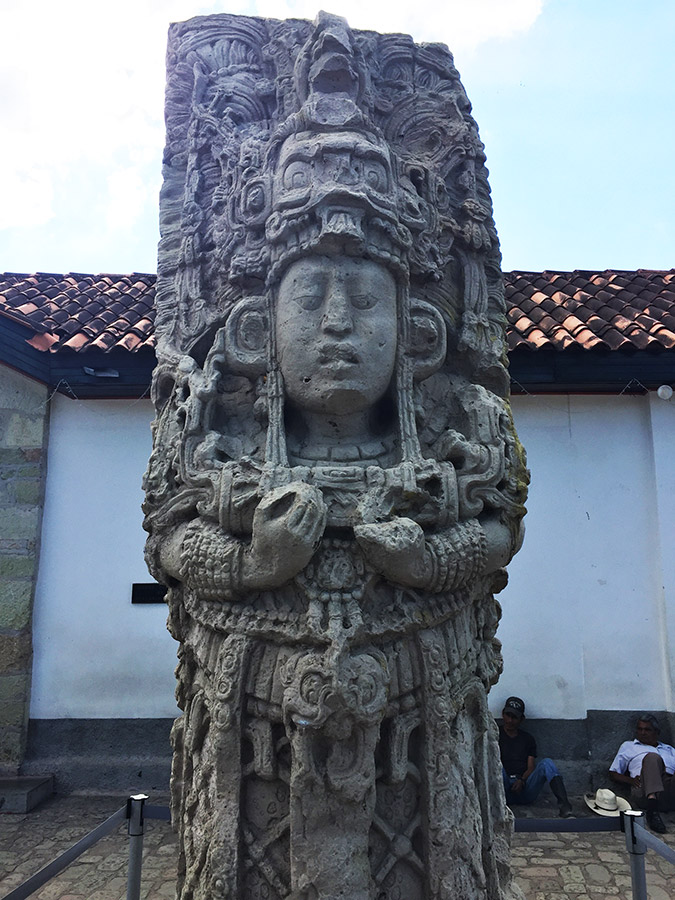
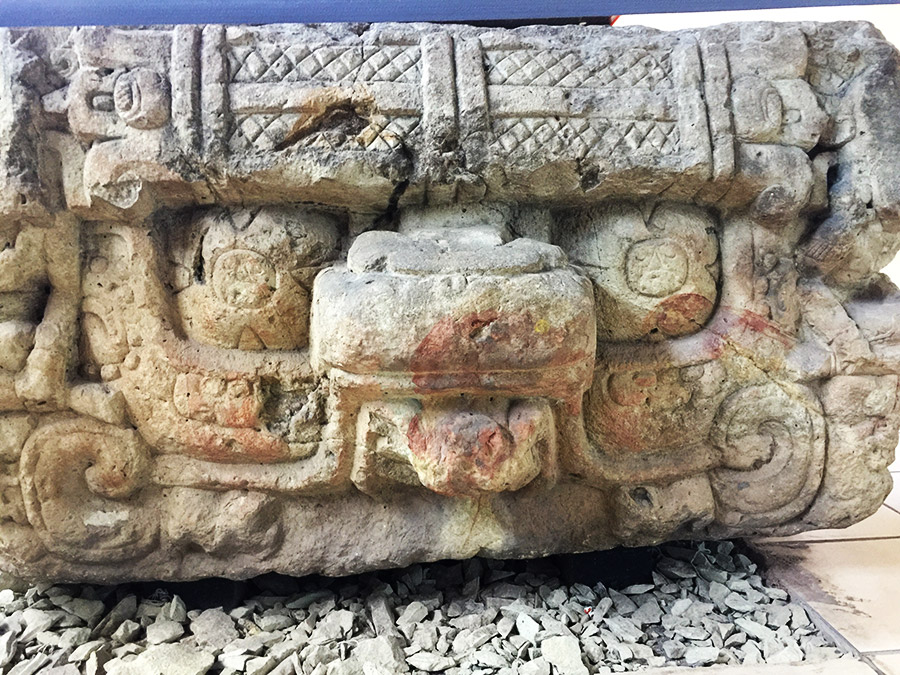
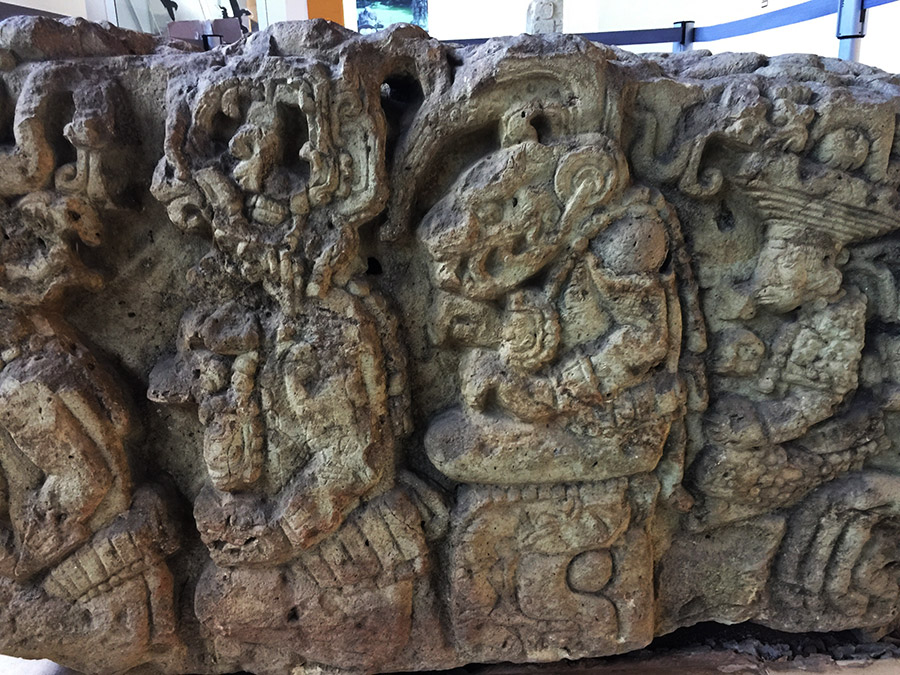
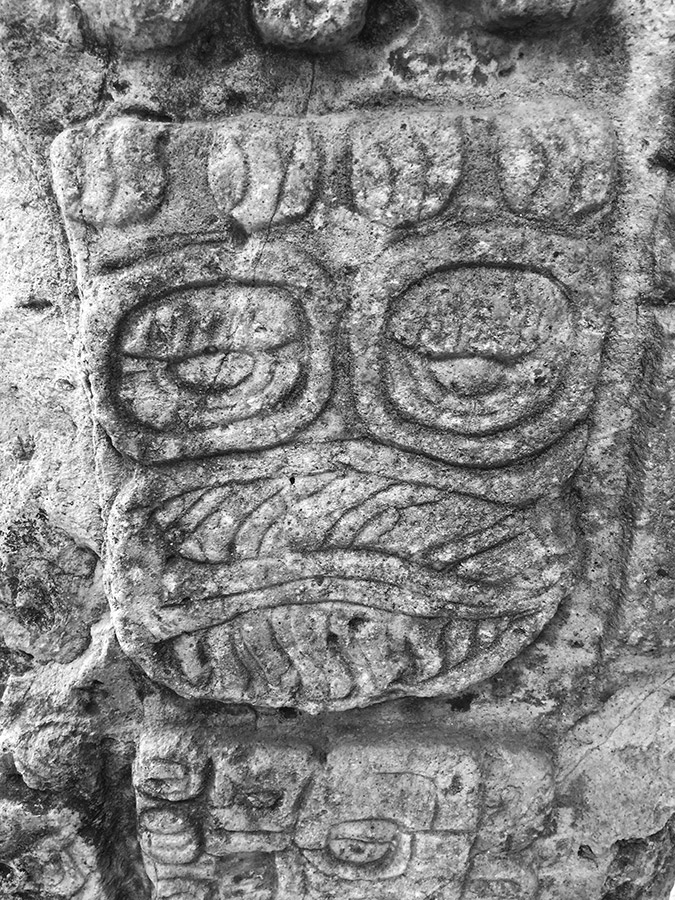
They say that if Tikal in Guatemala was the New York of the Mayan world, Copan was their Paris. Which means there was a French guy there who was like “Your French is terrible and you know nothing of cheese!” and nobody knew where in the hell he came from or what his problem was.
I had decided to walk to the Copan ruins from the town, which was supposed to be a nice scenic walk through the jungle with some statues and things along the way.
There aren’t really any signs for this, though, and I ended wandering along a trash-strewn stream with some chickens and a few down-on-their-luck locals.

Eventually it became clear this was not the stream I was looking for. I realized this when a rooster clucked at me contemptuously in Spanish. I turned around, walked back to the road, and hopped in a Tuk Tuk.
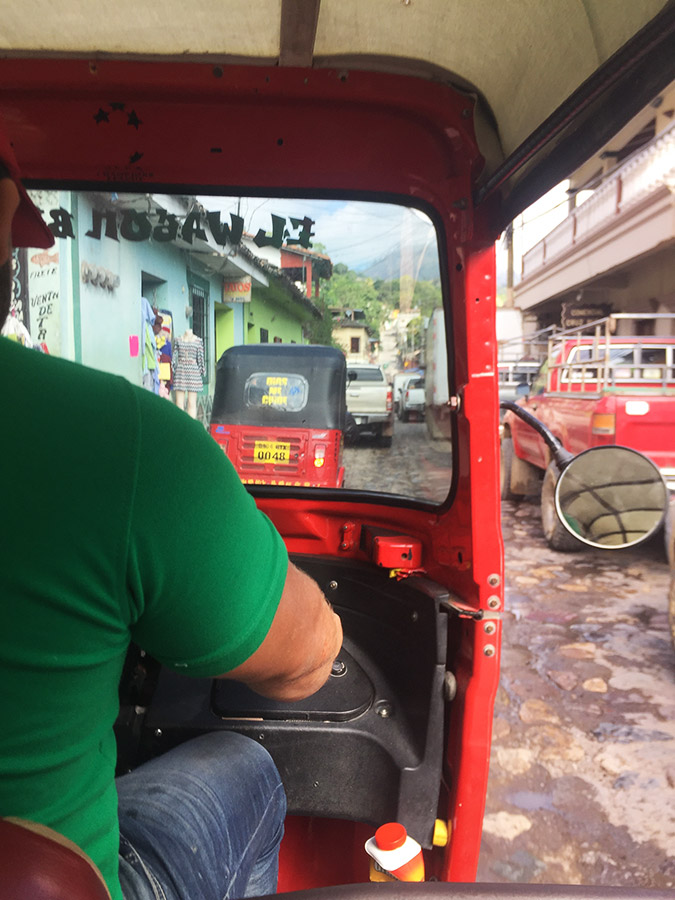
A Tuk Tuk is a hilarious three-wheeled scooter, also known as an auto-rickshaw or a glorified tricycle.
Walking up the path into the Copan ruins, macaws screamed from the trees above. I looked down just in time to see a disturbingly huge rodent run across the path. At the time I thought it was a capybara, a disturbingly huge rodent I had previously believed only existed in zoos. Looking at the photos now I think it was probably actually an agouti. Whatever it was, it looked like a chupacabra and wore an expression like he knew full well I didn’t believe in him.
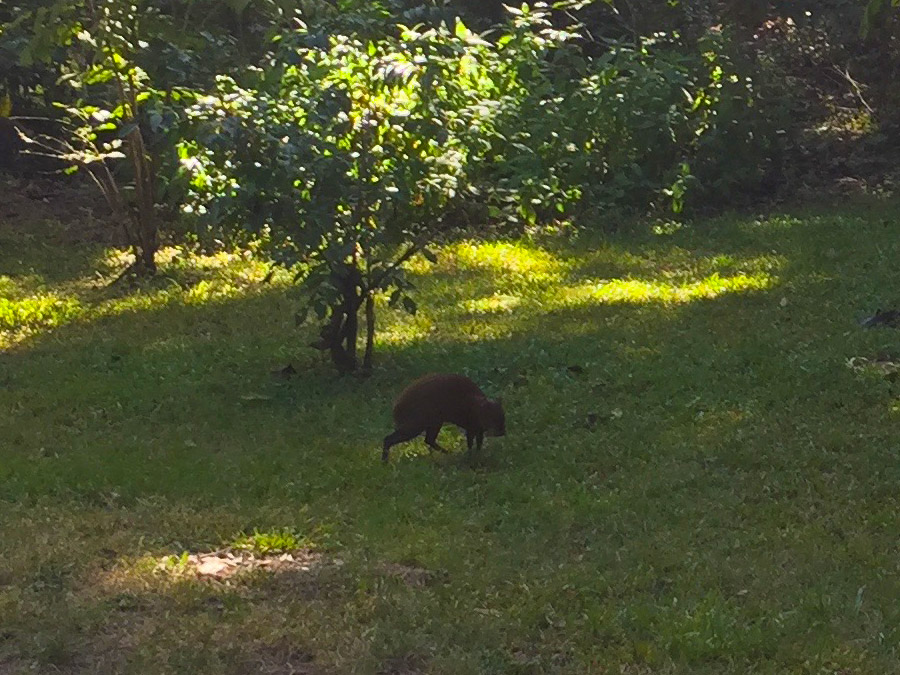
Copan was the capital city of the Mayan Empire between the 5th and 9th centuries, reaching a peak population of 20,000. It eventually fell from prominence when king Eighteen Rabbit was beheaded by one of his lackeys, because that's how the Mayans rolled.
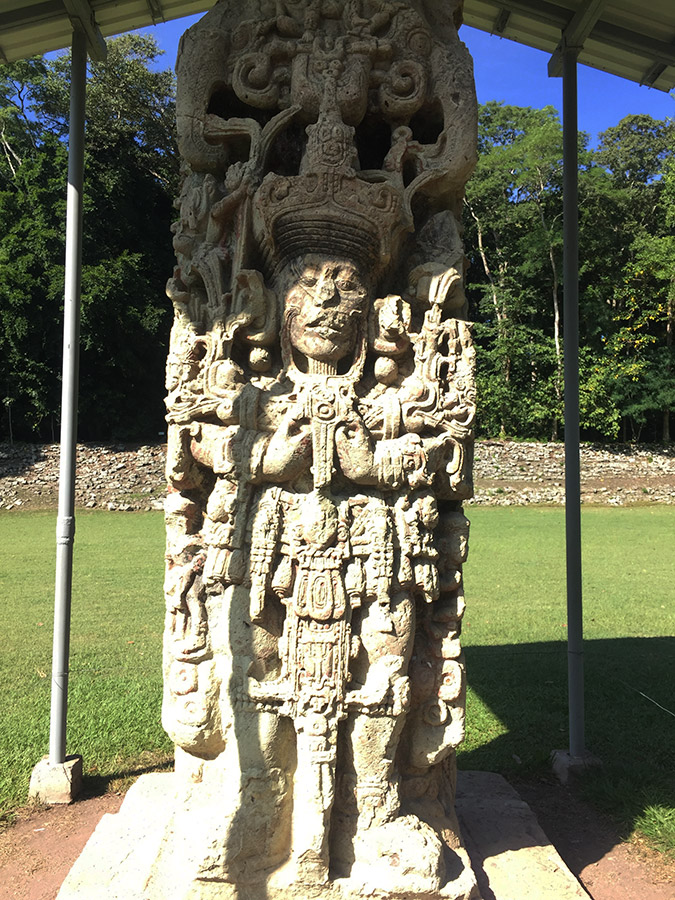
The stela carvings in Copan are alarmingly ornate, if you really knew what you were looking at you could spend hours perusing every detail of the carvings. The day I was there I knew a fair amount about the Mayan rulers and their history, but now four months later all I really remember is thinking “Yep, these guys were aliens.”
The grounds of Copan consist of stepped pyramids separated by wide grass lawns, dotted with stela depicting the great Mayan kings and also some turtles from a dream Donnie Darko had. You can climb most of the pyramids and snap photos of people debating whether or not it’s worth climbing the pyramids.
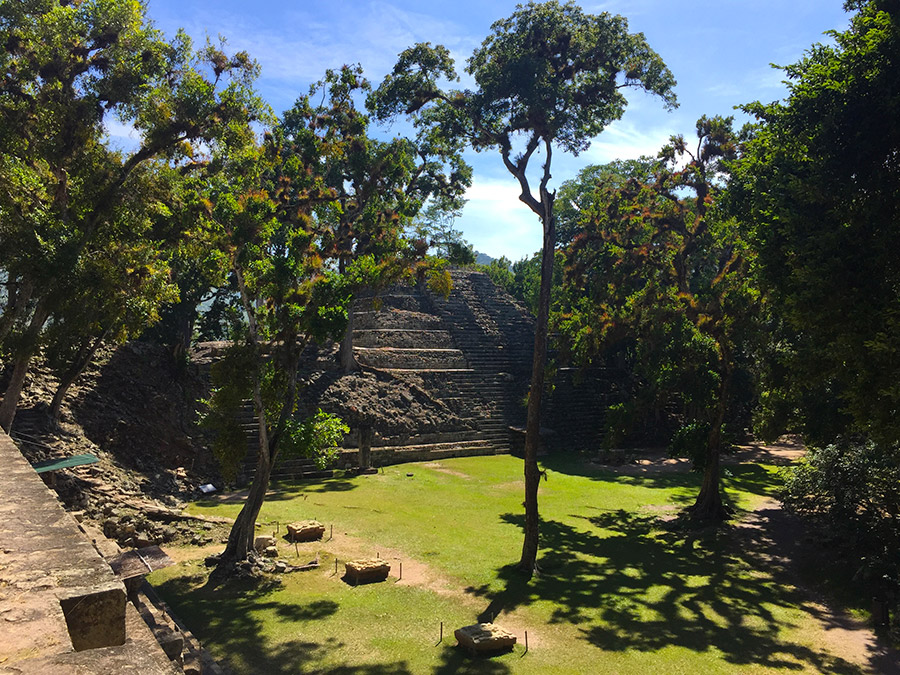
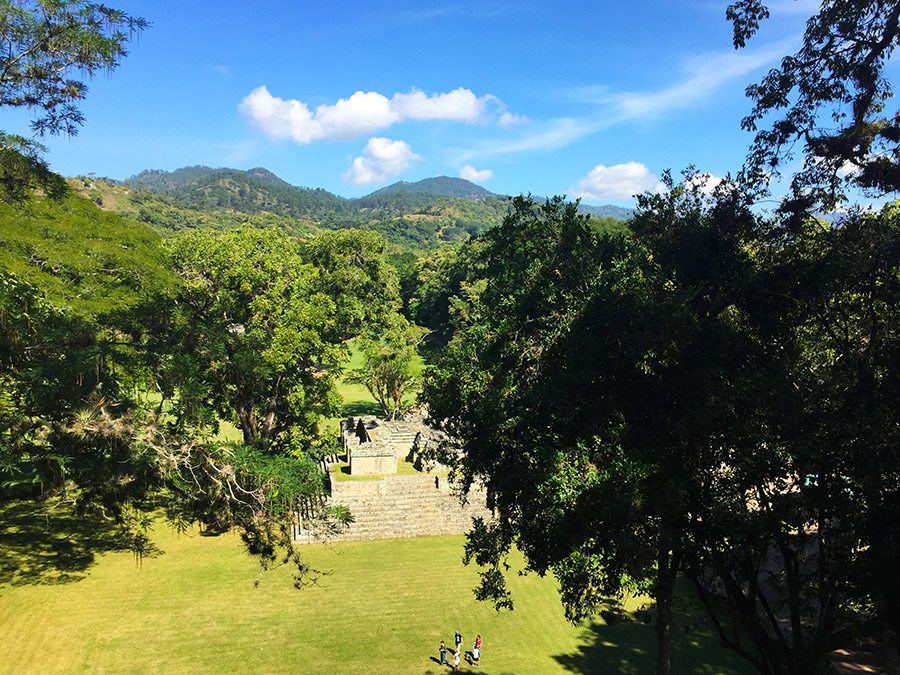
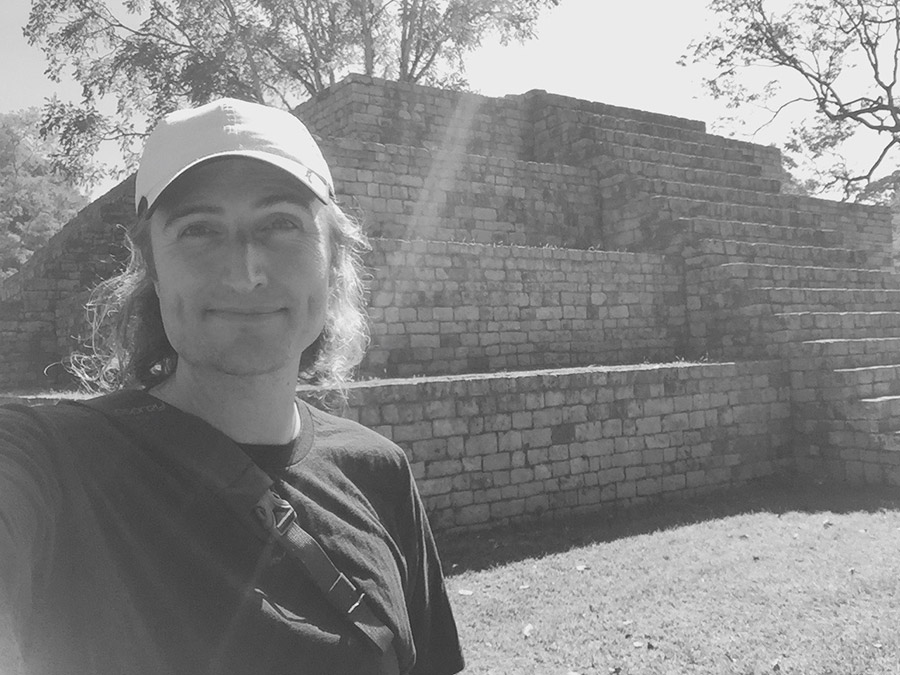

The centerpiece of the grounds is the hieroglyphic staircase, which is a small and poorly-named plastic chicken. No, I’m kidding, it’s a massive staircase covered in hieroglyphics depicting the history of the Mayan people. Except when archaeologists discovered the staircase it looked like a toddler had dumped out his bucket of LEGOs and then became distracted by a delicious-looking bottle of shampoo. It was a mess. So the archaeologists had to put the staircase back together themselves, with only a thin pamphlet of Ikea instructions as their guide. They did their best at guessing the correct order of the steps, but their best was terrible. In the process they made a hash of Mayan history, so now the story reads like Memento or, if you prefer, Mayan Pulp Fiction.
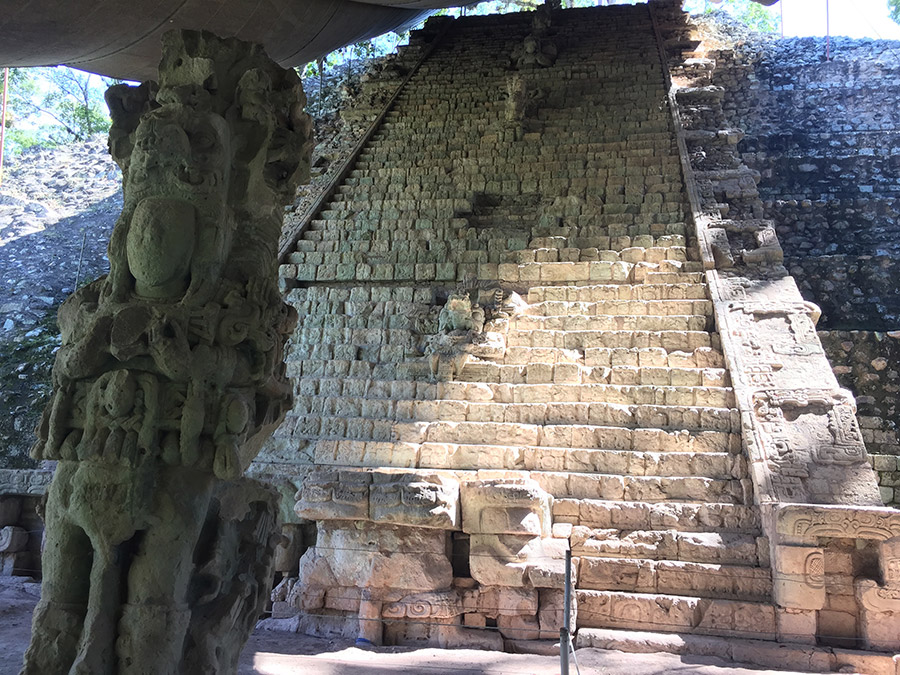
The secondary centerpiece of Copan is the ball court, where Mayan athletes kicked around the severed heads of their enemies or whatever they considered a sport back then, to the joy of the gathered sociopaths. My favorite thing about the ball court were the carved macaws overlooking the court, which were completely awesome. It takes a moment to notice their massive talons carved beneath the protruding heads.
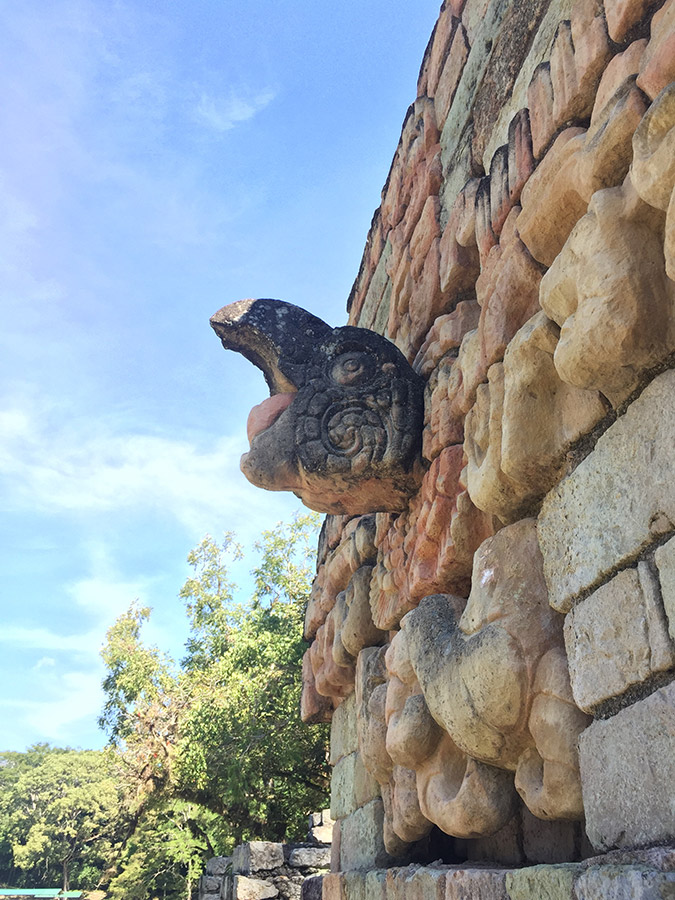
On the upper level of the ball court, near the macaws, there’s a small hidden room off to one side that didn’t look like it gets much tourist love. Inside, the air vibrated with energy and I felt like I was floating as I looked up at the stepped stone ceiling.
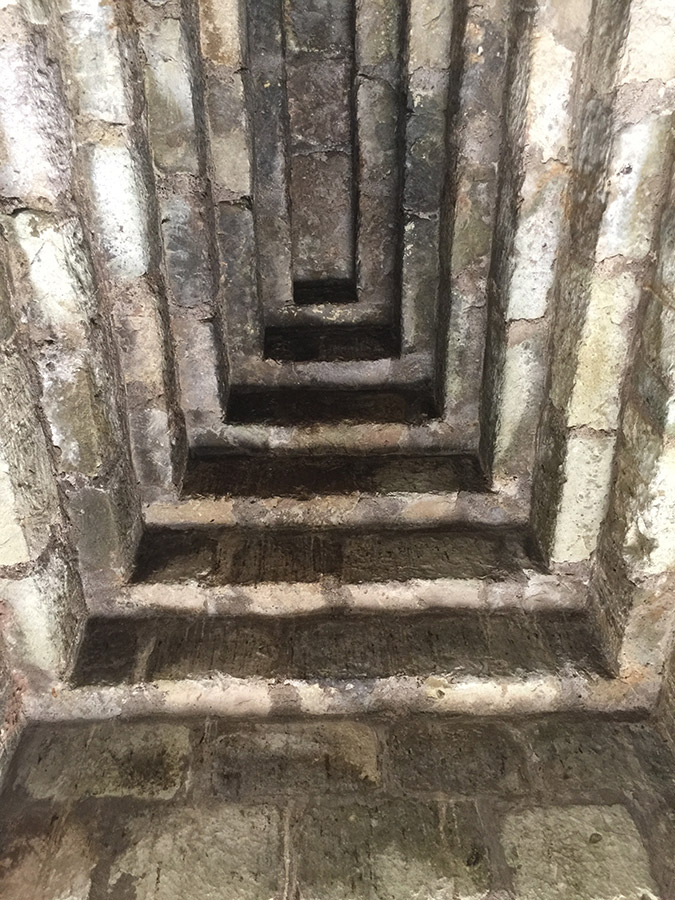
I wandered around the grounds, taking in the skull-adorned staircases and strange, scattered heads.
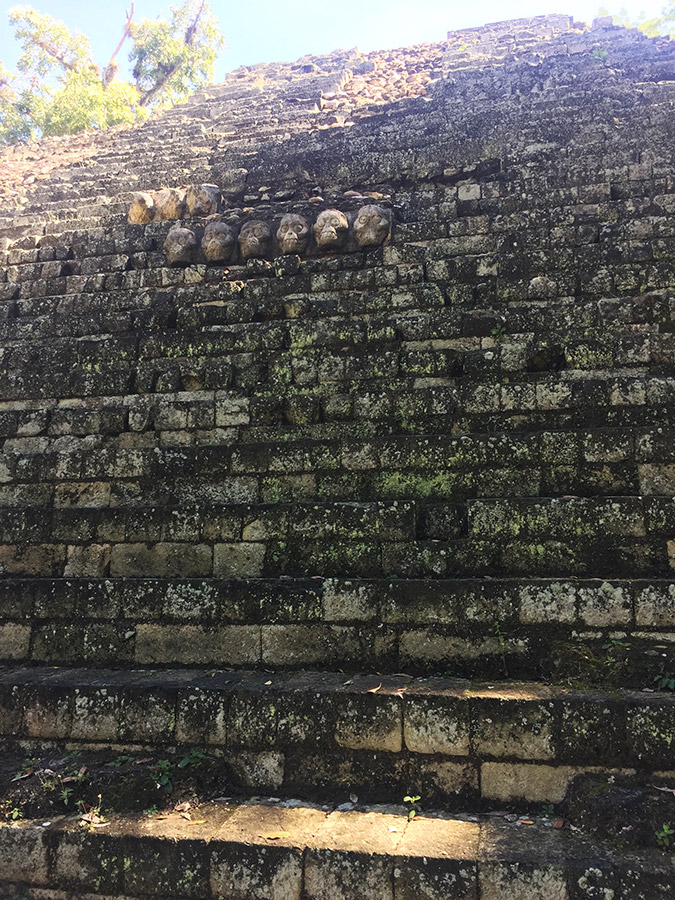
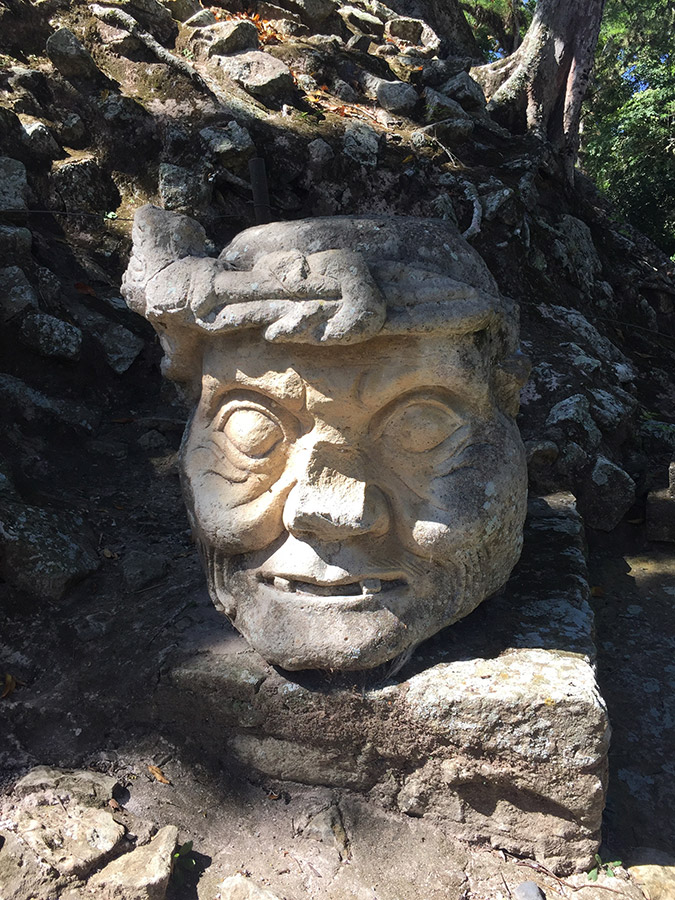
Eventually I ended up in some kind of unrestored ancient residential area, and then on a nature trail heading off into the woods. Following this led me to the Copan River.
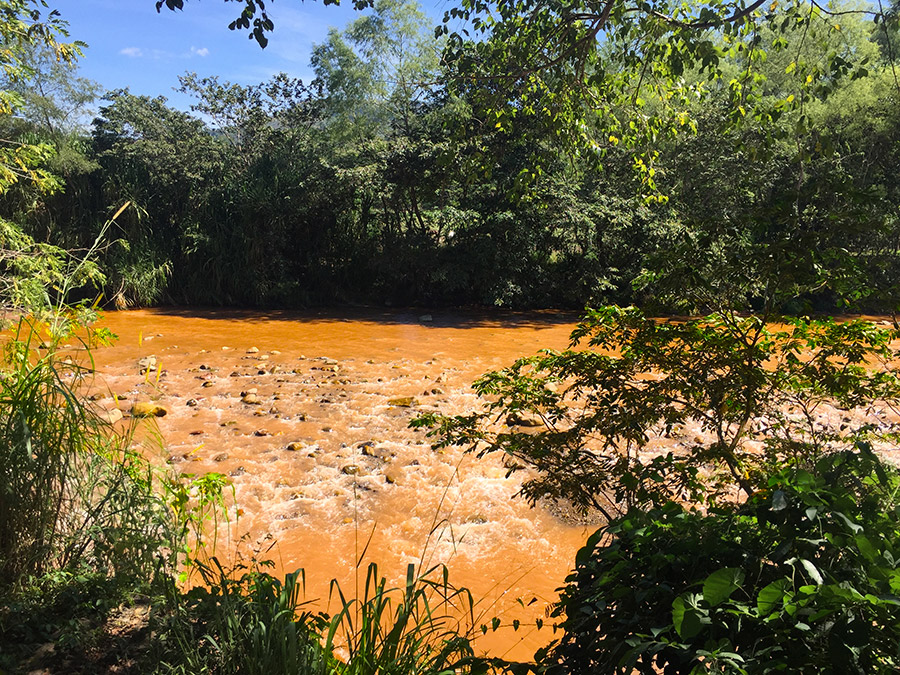
The trail ended at the Copan Museum, which I entered and was promptly kicked out of by a Honduran grandmother because I’d just blundered in through the exit. This was just as well because the actual entrance on the opposite side of the building was a giant monster’s mouth, leading to a hallway/throat that emptied out into the museum’s guts. It would have been a shame to miss all that.
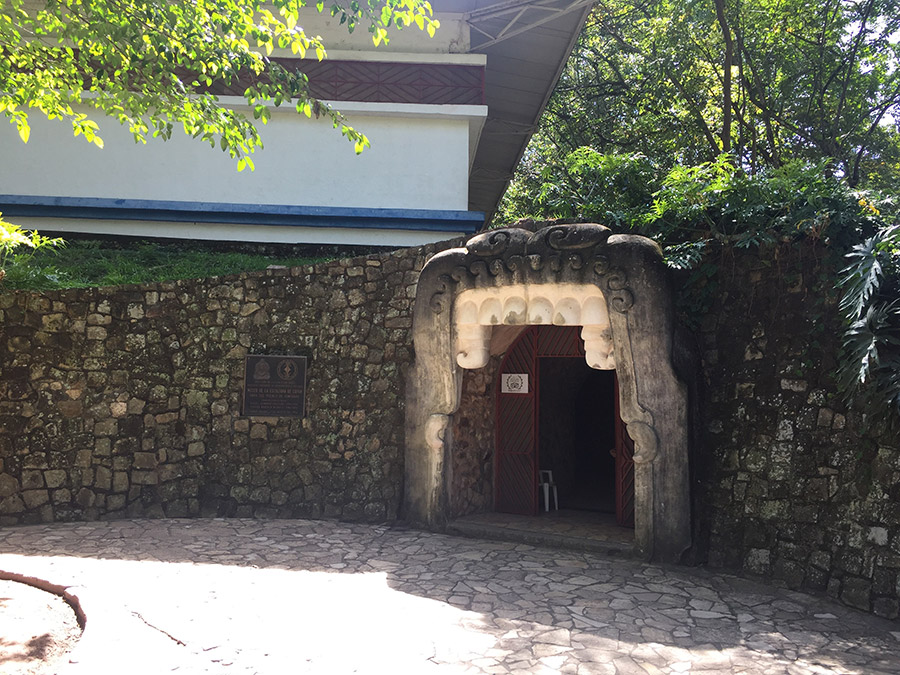
Inside, there was a life-sized copy of the Rosalila Temple, Copan’s most important religious sanctuary, the original of which still exists intact, buried underneath a newer temple that was built on top of it.
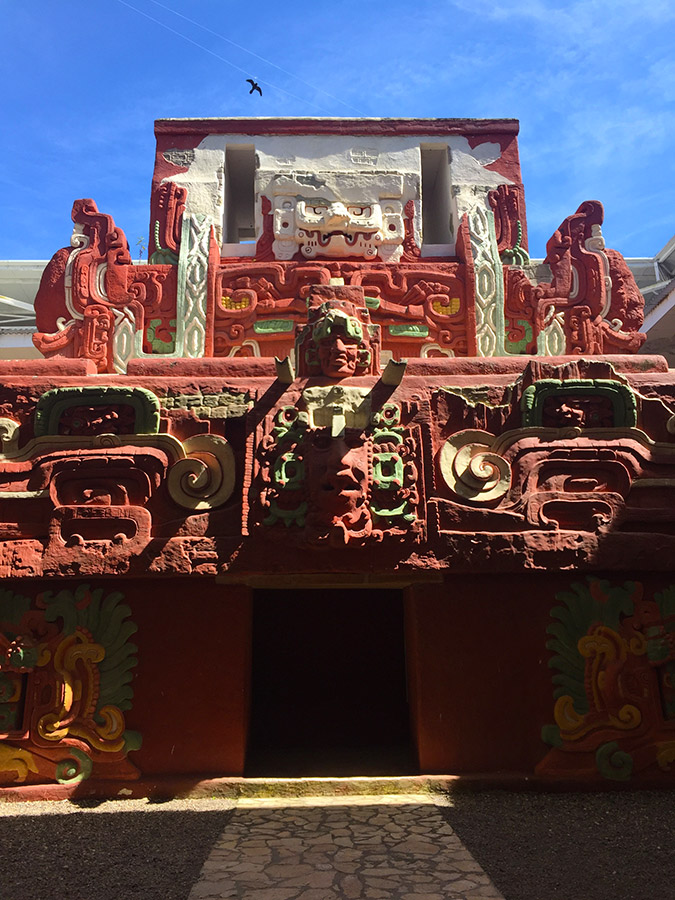
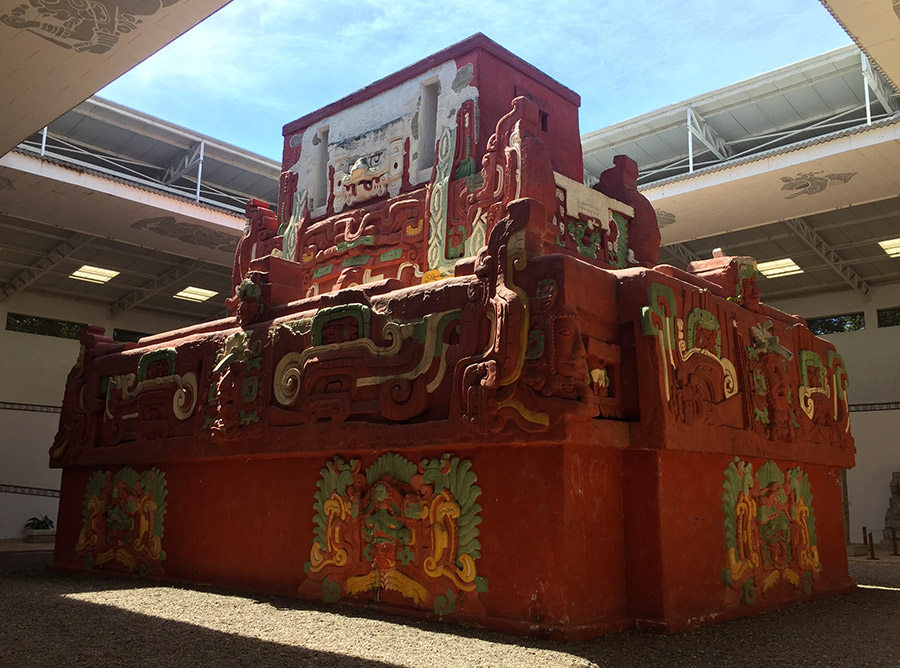
Many of the best-preserved artifacts from Copan were on display inside the museum, including this depiction of the Mayan god of “God You’re Such a Chicken.”
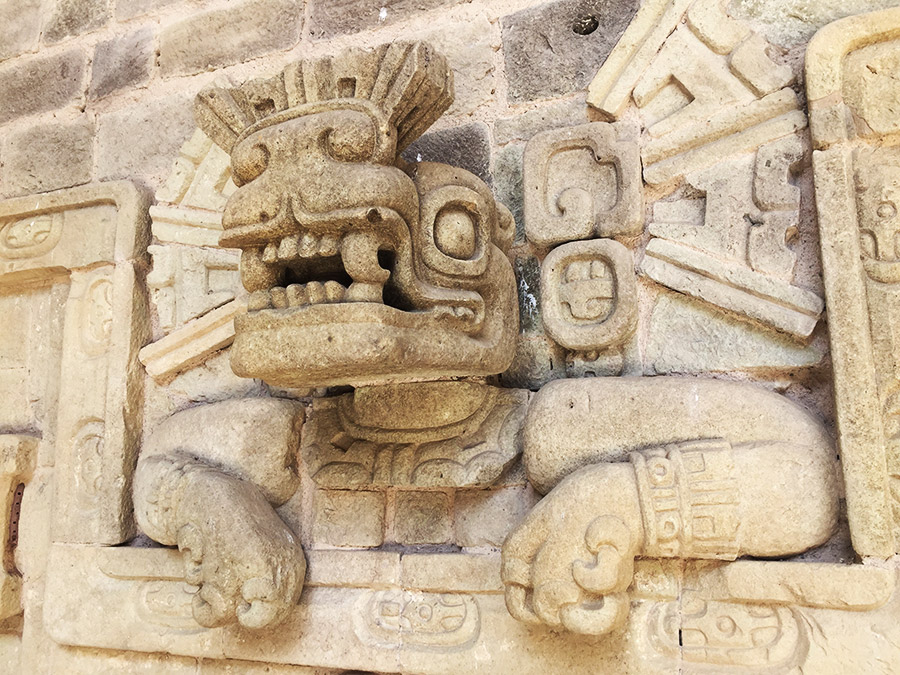
After chugging a bottle of water that instantly reappeared on my body as sweat like I’d poured in into a strainer, I hopped in a Tuk Tuk and asked the driver to take me up Macaw Mountain. On the way, we chatted as the scooter struggled its way up the mountainside. Thanks to my incredible, United Nations translator-level Spanish I told him that there are 6,000 people living in Minnesota. He seemed impressed. I’m not sure if it was by Minnesota’s population or the fact that I somehow manage to feed myself.
The Tuk Tuk driver dropped me off at the nondescript shed that marked the beginning of the canopy zipline run. This was supposed to be a series of 14 ziplines stretching over the top of the rainforest, more than a hundred feet off the ground.
I was quickly sized for a harness and helmet and jumped into the back of a pickup truck, which motored further and further up the mountain. Trees as far as the eye could see. Eventually the truck stopped at what seemed to be an entirely random point in the middle of nowhere. I climbed down and followed the guy who’d been in the truck bed with me over to a tree that had a couple of boards nailed to it. We climbed up onto what it would be a little presumptuous to call a platform.
While I was receiving instruction on how to survive the next hour, I kept looking down at the sagging boards we were standing on.
“Yeah, don’t stand there. That’s going to collapse.”
I shifted to the only other board, which was, at best, 5% more solid-looking than the one I had been standing on.
My guide and his apprentice walked me through how this was going to work. With one hand, you hold the pulley. This was a clip that went over the cable and which had a little wheel in it. With the other hand, you brake.
Every other zipline I’d ever been on had some kind of mechanical brake, usually operated by the guide riding tandem behind you. Now I was on my own, and there was no brake. How do I slow down?
They handed me a thick pair of leather gloves. Okay, I…?
“Just grab the cable and squeeze when you want to slow down.”
Hoookay.
“Make sure you grab behind the pulley or else it’s gonna be ugly.”
I pictured my fingers going into the pulley and nodded.
The apprentice clipped in and zooooomed across the cable to a barely visible tree off in the distance. My turn.
To clip in I had to grab onto the cable and yank down, bouncing by body up off the ground so my guide could clip my pulley onto the cable while I was in mid-air.
“Okay! Whenever you’re ready.”
I let go and whizzed off the platform (Editor’s note: Pick a different wording that doesn’t sound like you’re peeing, thx.), accelerating through the open air. I looked down and there was the forest floor, waaaaaay down there. The tops of trees blurred by me. Above, only sky. The pulley whirred at a louder and higher pitch as I accelerated. Wow! This is awesome. Thanks Honduras.
About two-thirds of the way along the cable, I looked at my guide’s apprentice standing on some boards nailed to the tree at the end of the cable. He was frantically gesturing with both hands, palms facing the ground. What is he? OH! Slow down!
I was approaching the tree at a mind-numbing speed. I grabbed the cable with my thick-gloved hand and squeezed. Slowly, I began to decelerate as the glove heated up. Thankfully, I stopped before I hit the tree. The apprentice bounced me off the cable, unclipping my pulley, and my guide came in fast behind me. I ducked under the cable to get out of his way a second before he landed on the platform.
One down! 13 to go.
On the second run, as I launched off the platform, my guide yelled for me to turn around so he could get a photo.
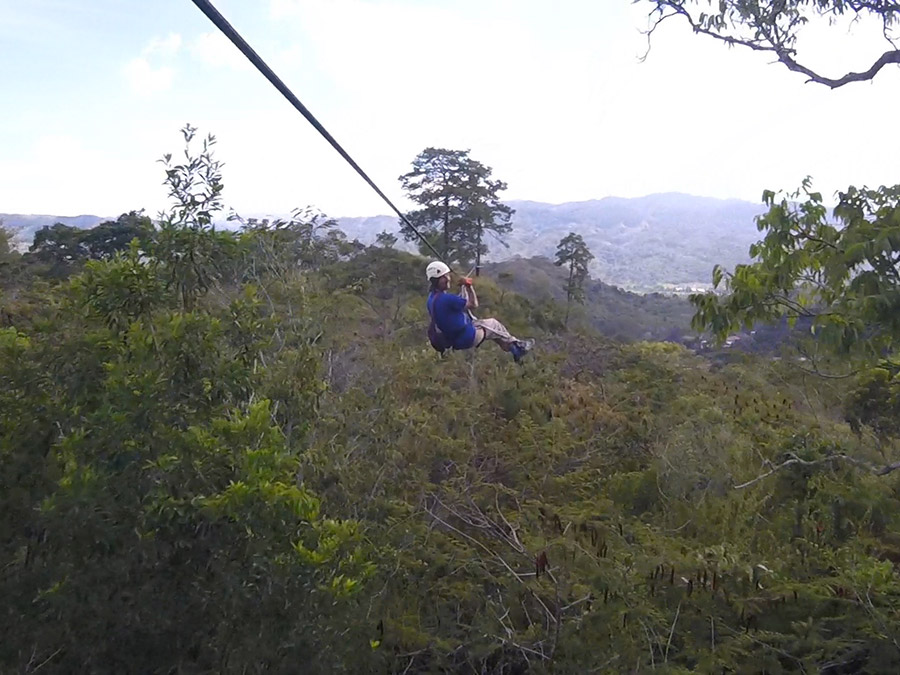
As I turned and looked back at my guide, I heard a loud BRRRRRRRRRRRRRRROW noise and suddenly realized my helmet was touching the cable and was having a groove dug into it by the cable that was whizzing by. Whoops!
The first two ziplines were fairly basic, so you could get your bearings. Then they grew faster, longer and more interesting.
On one of the runs my guide rode right in front of me, so the backwards-zipping guy could take photos of the guy doing the much less impressive thing:
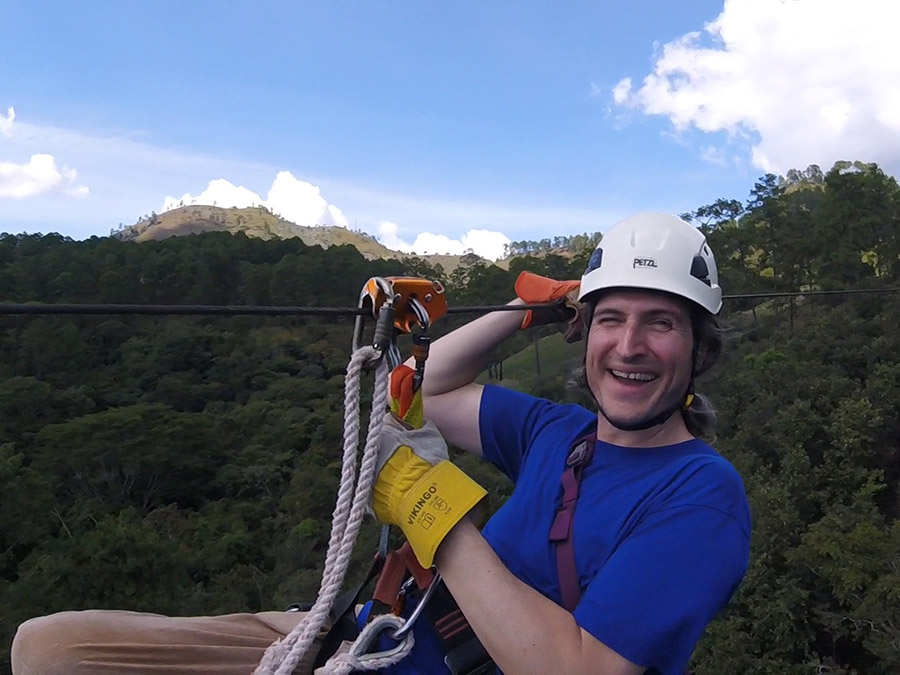
The middle runs had you flying through tiny gaps between the tree branches.
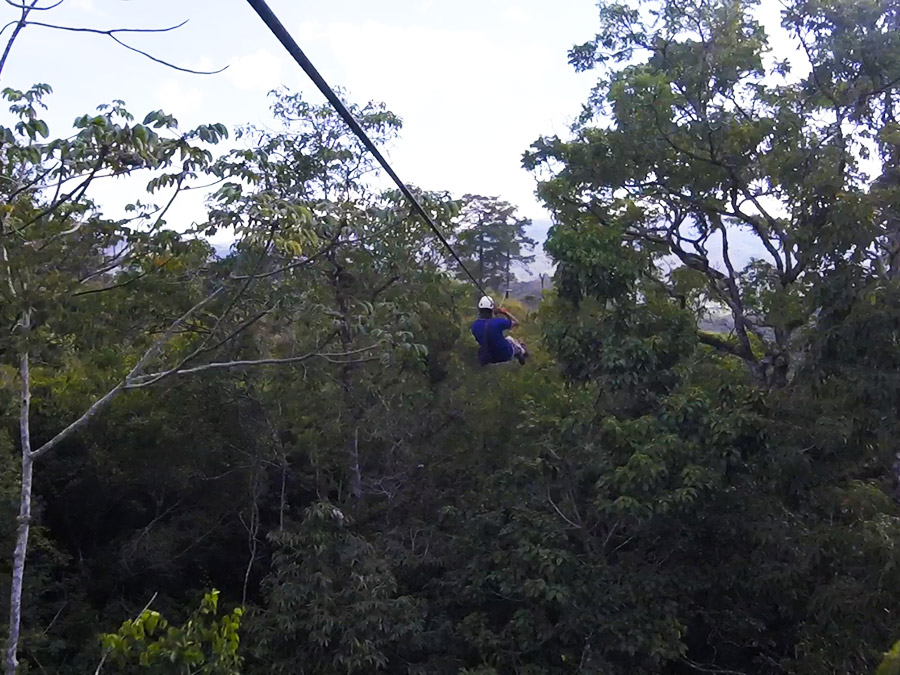
The longest run was a kilometer long, which is a long time to be scorching along a cable with the wind blowing up your pantlegs. The fastest cable was especially exhilarating, both for the thrilling run out over the open canopy, and for the fact that with the braking glove heating up to molten levels I only sort-of stopped in time at the end, using my feet as brakes when I hit the tree the cable was attached to.
Just in case I didn’t make this clear from my description of the “platforms” and the garden gloves I was using as brakes, this whole thing was janky as fuck. As I flew through the air I tried not to think about how the “company” behind this is a couple of guys who tied some shit to trees.
On about the 11th run, the cable suddenly shuddered and began to bounce up and down. I looked back to see my guide hanging from the cable behind me and whipping it up and down. Oh shit. The whip traveled along the cable like a wave and when it reached me, it popped me up off the cable completely. I was flying through the air, not attached to anything, momentum carrying me forward through the forest air. After a second I fell and the pulley caught the cable again. ZZZZZZZZZIP. I laughed, then another bounce pitched me up in the air, off the cable and flying free. Drop, catch, zzziiiiiiiiip. Ha! Yeah, there’s probably something wrong with me.
At the start of the next run, my guide’s apprentice asked “Up and down, or side to side?” Uhm, side to side? Why not?
I took off from the platform and when I looked back, the apprentice was putting his entire bodyweight into whipping the cable from the side to side. I suddenly began to swerve through the air, swaying left and right. Ha! This is pretty c- I realized I was headed straight for a tree. Oh shit oh shit oh- the cable suddenly whipped to the right at the last second and I swerved through a small gap in the branches.
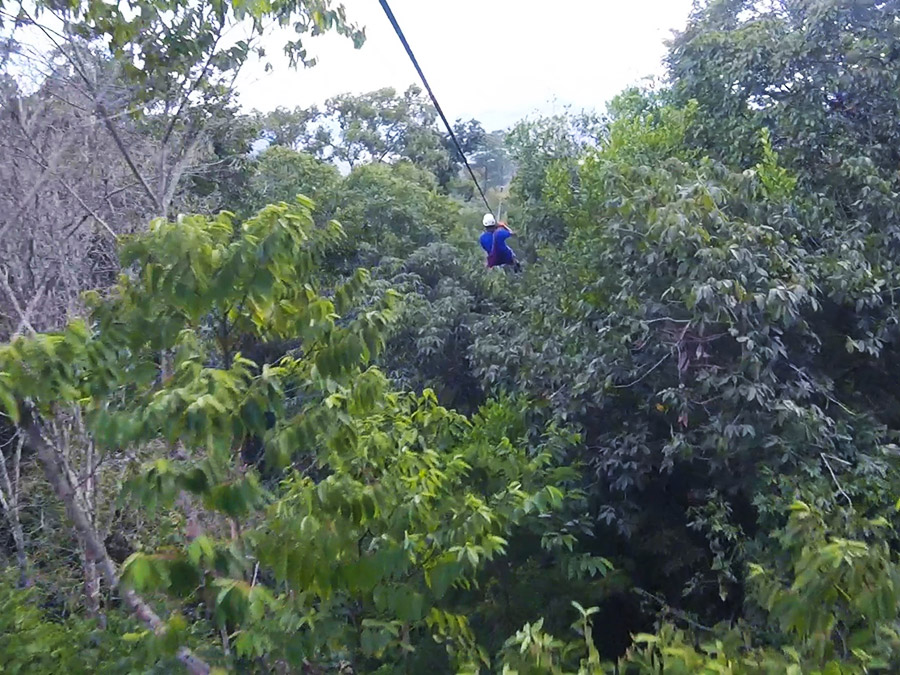
Oh, you magnificent bastards.
At the end of the final run, my guide gave me a Tuk Tuk ride to the Macaw Mountain bird sanctuary. We shook hands goodbye and I thanked him for failing to killing me.
The air inside the sprawling sanctuary was thick with the screeching of countless macaws. The beautiful red birds sounded like a rusty junkyard being dragged through another rusty junkyard.
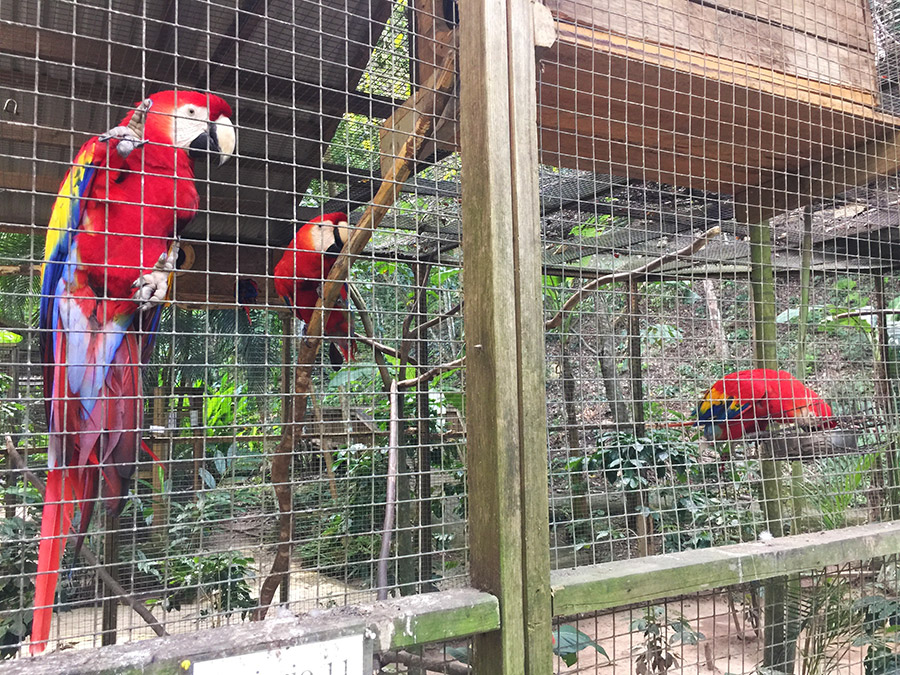
As I walked around, admiring the birds, I wondered if there was a spiritual purpose to this trip. I tuned into my guide Kobo Daishi and asked him. He said “open your heart,” which is something he says a lot but he’s also pretty much always right. I stopped at an enclosure of dozens of macaws and tuned into the birds. As I watched them, I began to envision a light swirling around each one, penetrating through them. I pictured each bird rising up into a higher vibration. This progressed until I saw and felt an energy of love radiating out from my heart and swirling around each bird, permeating them in a radiant field.
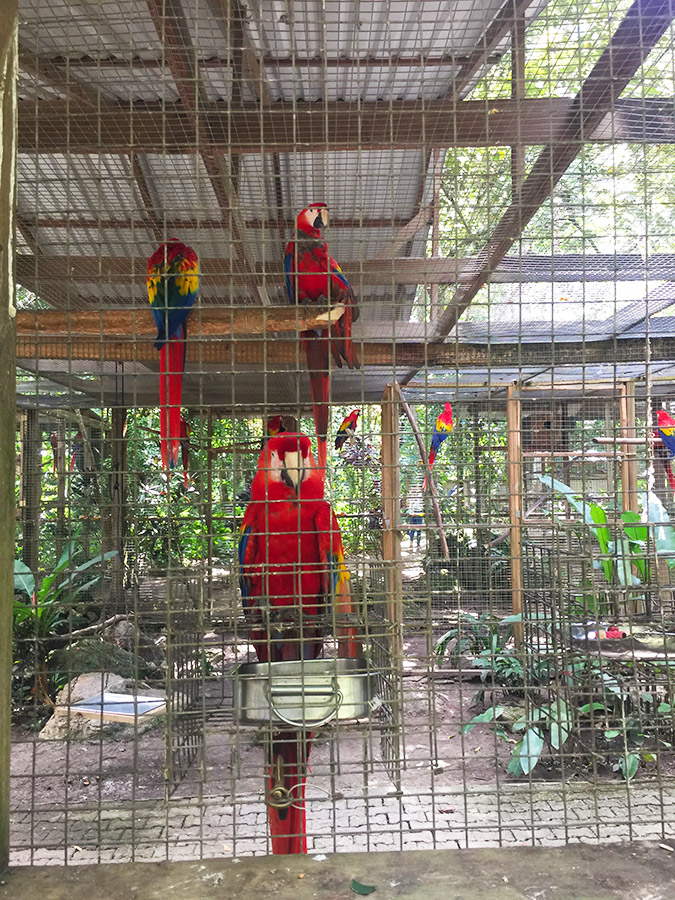
After a few minutes of this I suddenly realized all the birds were utterly silent. A few minutes ago, this place had sounded like the end of the world. Now all the birds were just silently watching me. I continued to go deeper with this energy visualization as a stronger and stronger bond seemed to form between me and the macaws. I felt a sense of hushed appreciation from the birds as we connected in that moment. Huh. I didn’t know I could do this.
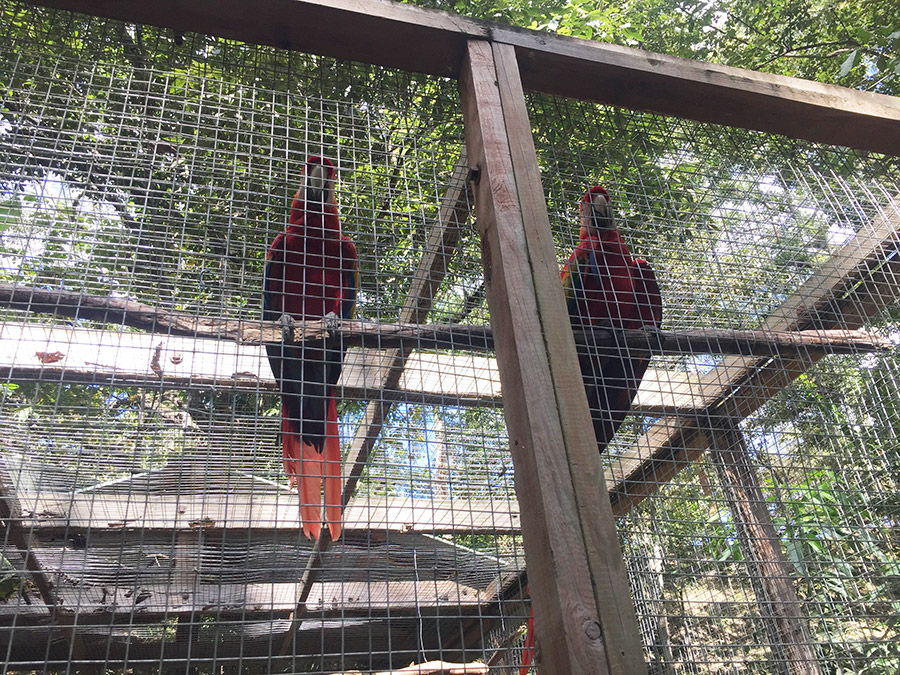
Each time I left a group of birds to move on and tune into the next, I felt a visceral energy of “Hey, come back!” coming from the birds I was leaving.
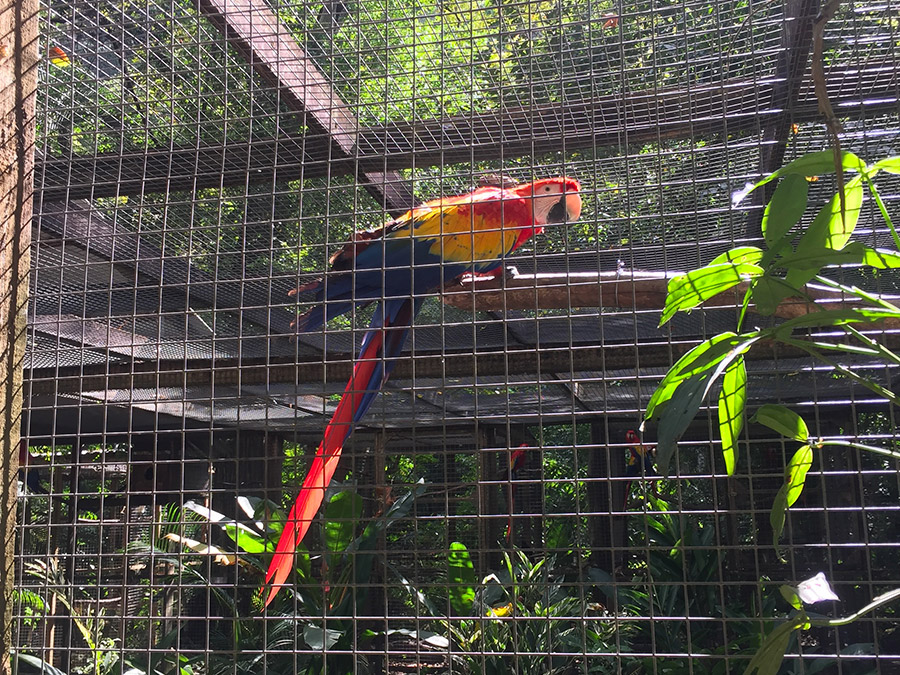
After returning home to Minneapolis, I started tuning into the birds in the trees off my balcony and doing these same visualizations for them. One small red cardinal seemed to especially respond and kept coming back to the same spot in the same tree where he'd been sitting the first time I focused on him. Each time he came back I’d tune into him and do another visualization. The cardinal would sit and soak in the energy for improbably long periods of time, staring straight at me, while all the other birds came and went. After practicing this a few days in a row, I started waking up in the morning to find him waiting there for me in his spot outside my window.
Back in Honduras, I carried on to the enclosures featuring other types of birds. One small green bird came over to the fence and pushed his head against it, hard, next to my hand. Huh. I scratched the top of his head and he radiated a feeling of satisfaction.
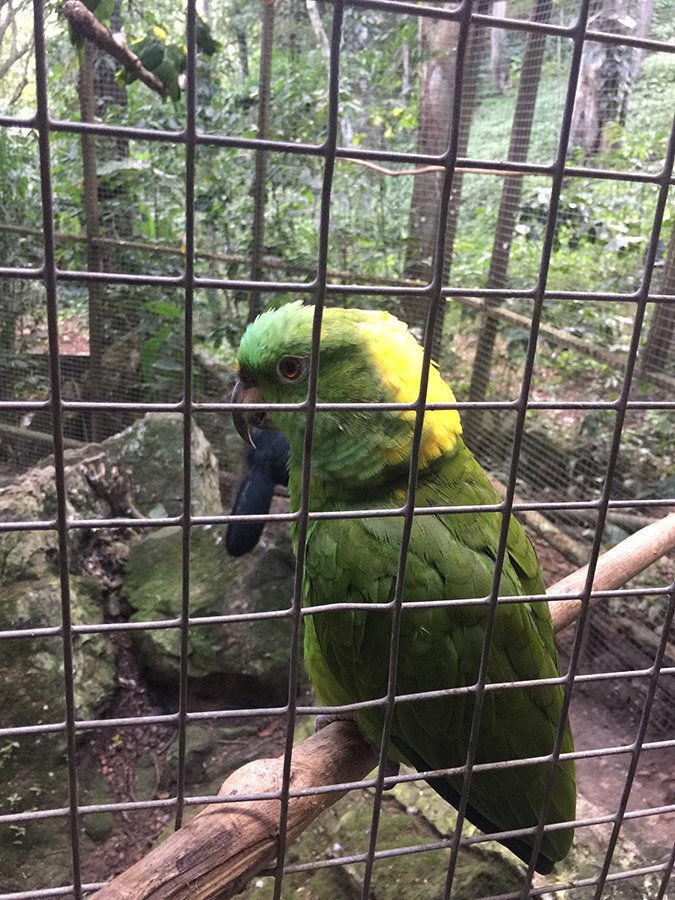
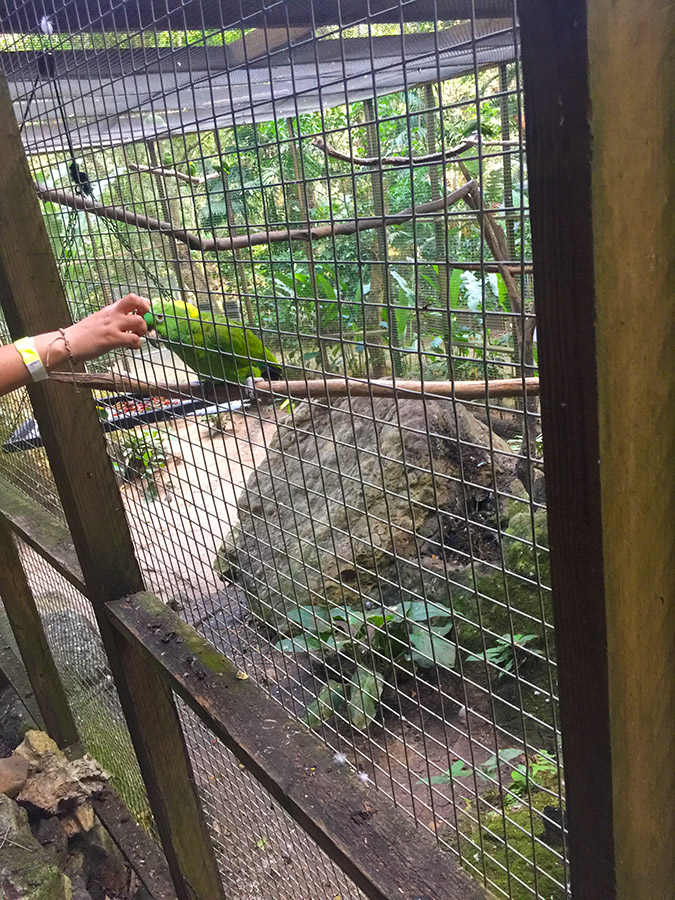
Near the end of my loop through the sanctuary, there was a small area where you could hold birds. Before I knew what was happening, I was covered in birds. Two things to note: (1) These birds are way heavier than they look. It’s a miracle they can fly. (2) It’s really, really hard to smile with a macaw digging its talons into your scalp.
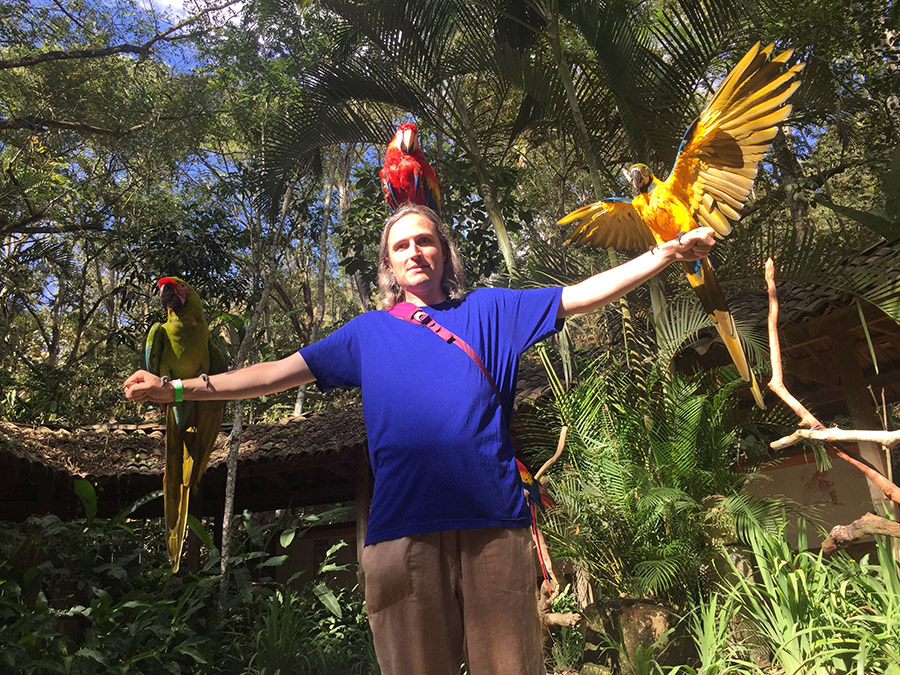
On my way out of the sanctuary, I watched the other people interacting with the birds. A woman banged repeatedly on an owl’s cage, demanding that it turn around so she could get a photo of it. Children squealed and tossed things at the bird enclosures while their parents looked on with no sense of disapproval. “HEY YOU! HEY BIRD! LOOK HERE BIRD!” The birds cringed in the far back corners of their cages. The contrast between what I was seeing and the connection I had just experienced with the birds myself was disorienting. I watched the people like they were some different species I had never seen before.
For a moment I felt disgusted by them, but then in an instant I began to see their energy. Each person was in their own cloud of chaotic energy, like a dark haze around them. I could see all of their patterns of thoughts and emotions, and everything they were taking in from the culture around them, television, music, whatever it was they surrounded themselves with, this cacophony wrapped around them like a cocoon.
I immediately felt desperately sad for them. Not out of a feeling of superiority, but rather a deep sympathetic recognition that this is the human condition. To be unable to reach through our own cloud and touch something deeper, within yourself or another being. How lonely. I could see my younger self in that same dark cloud. Even the clearer place I’m experiencing now will likely seem like a shitty haze to some future, clearer version of me.
This moment of clarity was both beautiful and utterly heartbreaking.
When I was on my way to Honduras I had an overnight layover in Miami. As I Ubered around the city looking for vegan dinner, I marveled at the radio. I hadn’t heard the radio in years, I don’t watch broadcast TV and I avoid commercials like the plague, so suddenly being exposed to that world again was like observing an alien culture. The radio station bumpers blared between songs. “WZFL! We make your work day go faster!” Huh. What weird mental programming. Life is drudgery, best to put it on fast forward. To what end? Retirement? Death?
A song fired up and the singer bemoaned what a piece of shit he was and how only the love of this girl could save him. The next song followed with the singer bemoaning what a piece of shit he was and how only the love… Man, I’ve always just accepted this as normal but when you get far away from it and suddenly come back, it certainly seems like a particularly disempowering form of brainwashing. I know that sounds extreme, but what forms our concepts of what life is and what’s possible for us if it’s not movies, music, news, etc? We have mistrust of so many things, but seem to have utter faith in the benevolence of our mass culture as a whole, like it never occurs to us that it might not be serving our best interests. But why would it be? There’s no money in our awakening or fulfillment.
I suppose we accept it at face value because there doesn’t seem to be some overarching entity orchestrating it all. So we think it must be, at worst, neutral. Just a mass of people producing different things and we tune in to whatever appeals to us individually. No harm done. And even if it’s negative, we’re strong-minded enough to not be effected by it, right? I’ve believed that before. I’m not sure I still do. It makes me think of how no one believes advertising works on them, and yet so much money goes into churning it out, decade after decade through every possible avenue.
I’ve had experiences before where I could suddenly see people’s energy, see the haze around them. Sometimes it happens in airports. Sometimes I can even see or feel what that person is preoccupied about. But this experience in Honduras was so upending and emotionally jarring that it changed something in me. Since I’ve been back home I’ve been experimenting with what I call “culture fasts.” Taking a week off from reading the news, browsing the internet, watching television, movies, even listening to music. It’s challenging to do, at least at first, as you become aware of the little addictions you have to these things, ways that you use them to escape the moment.
But after a few days of this I started to encounter little windows of clarity I’d never experienced before. An hour or maybe two where I could suddenly see and understand things I never could before, experiencing a first-hand knowing of things that previously seemed unknowable. And in that clarity I could now see my own haze, the cloud that had been obscuring my ability to see right up until that moment. The cloud I had never been aware of because it was always there, always around me. It was just the way existence seemed to be, until it was gone.
Rule #1 of building your blog readership: Don’t advise people to stop reading things on the internet. Whoops.